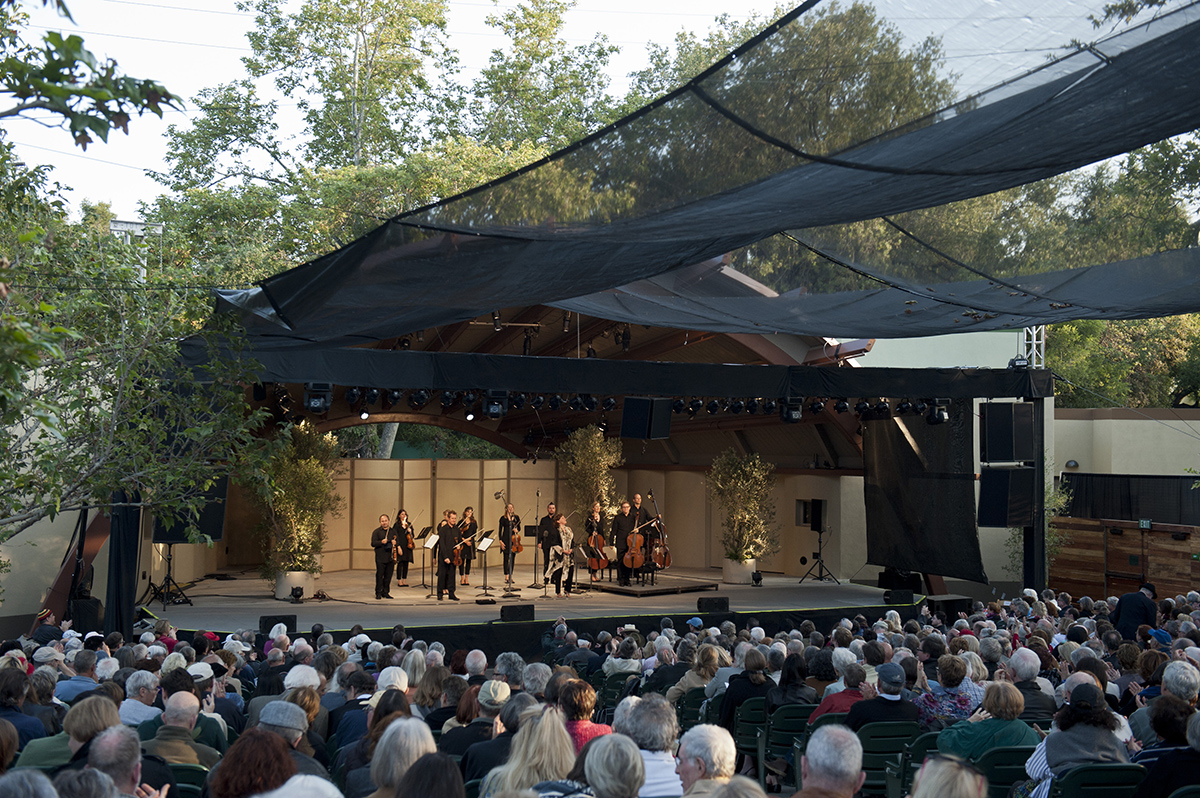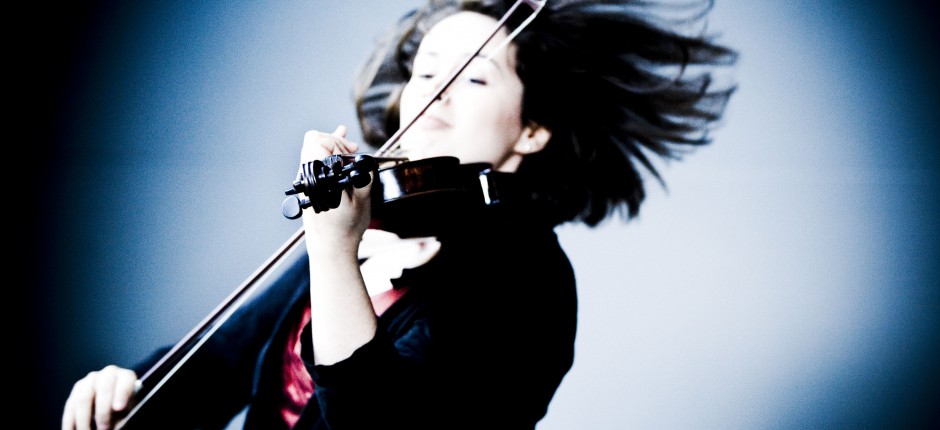Patricia Kopatchinskaja on Interpretation
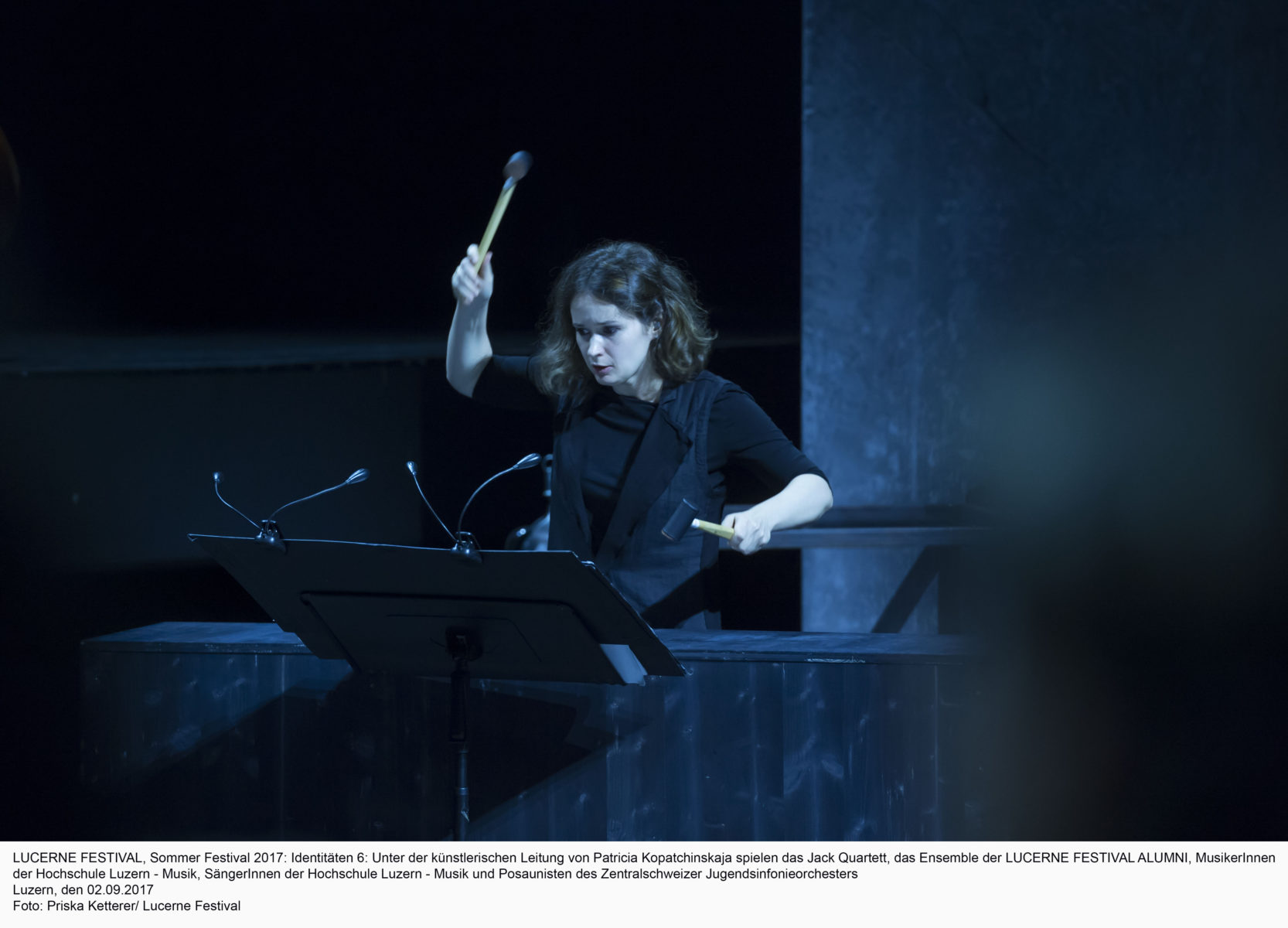
Watch 2018 Music Director, Patricia Kopatchinskaja, explain her vision for the Festival. Audiences can expect innovative staged concerts, premieres of new work, and important works of the past – works that will be given new life.
2018 Music Director Patricia Kopatchinskaja discuss the life changing quality of Michael Hersch’s music. The Ojai Music Festival will present the world premiere I Hope We Get A Chance To Visit Soon by Mr. Hersch at the evening concert on Friday, June 8.
Michael Hersch’s solo and chamber works have appeared around the globe. We are honored to welcome Mr. Hersch for his Ojai Festival debut as a composer and performer during the 2018 Festival.
I Hope We Get A Chance To Visit Soon is commissioned by the Ojai Music Festival, Cal Performances, Aldeburgh Festival, and PNReview.
2018 Festival Line-Up is Announced
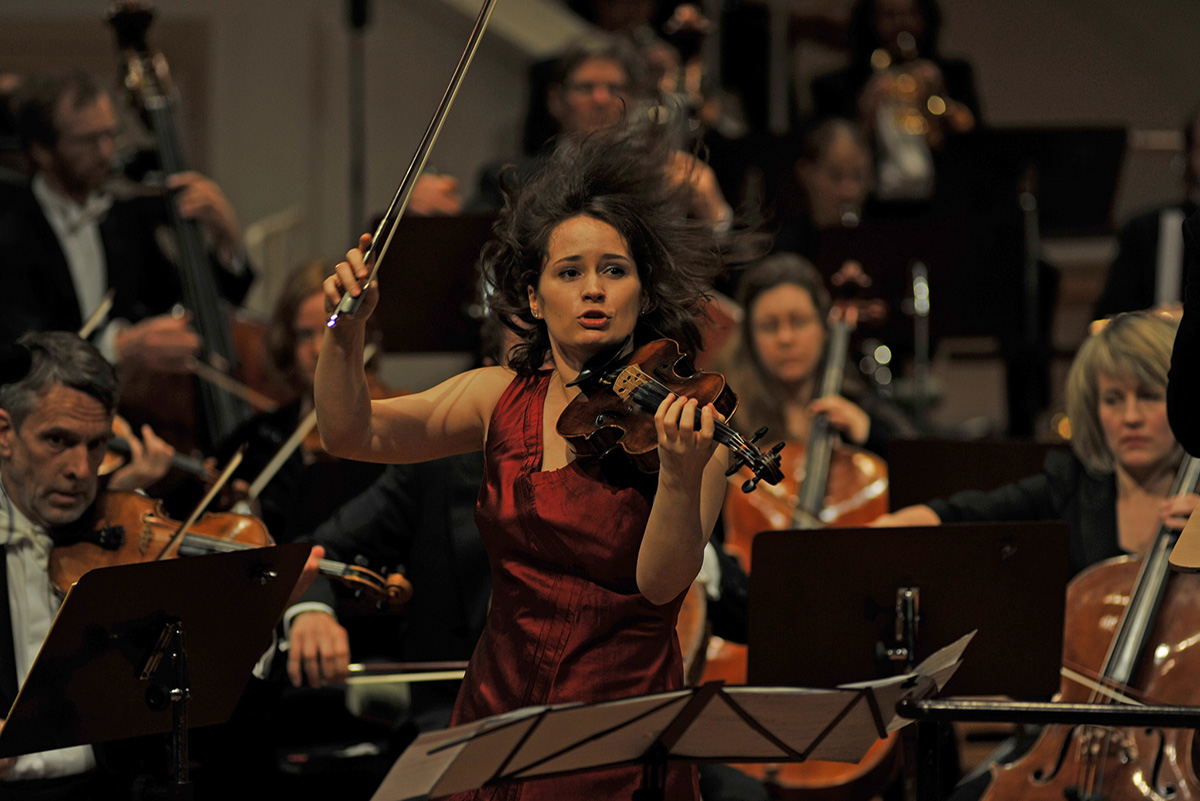
“Ojai is special. There is no fight with new music, no fear — just curiosity and hunger for fresh music of today. The Ojai audiences are completely open minded, and it’s a wonderful possibility to do music that I truly enjoy and find powerfully relevant in our present world. Ojai is magic,” Patricia Kopatchinskaja, 2018 Music Director.
“When I first met Patricia Kopatchinskaja, I knew she was a natural to be Music Director of the Festival. She is, quite simply, a force of nature. Her unstoppable energy, blazing virtuosity, and relentless curiosity are irresistible. The 2018 Festival will showcase her wildly diverse artistic talents as a violinist, a collaborator, a director, an advocate, and as a creative force. Patricia sees music in the context of today’s social and political issues so the 2018 Festival is one that will surely offer confrontation, questioning, and healing. The 2018 Festival aims to capture Patricia’s infectious energy and virtuosity,” Thomas W. Morris, Artistic Director.
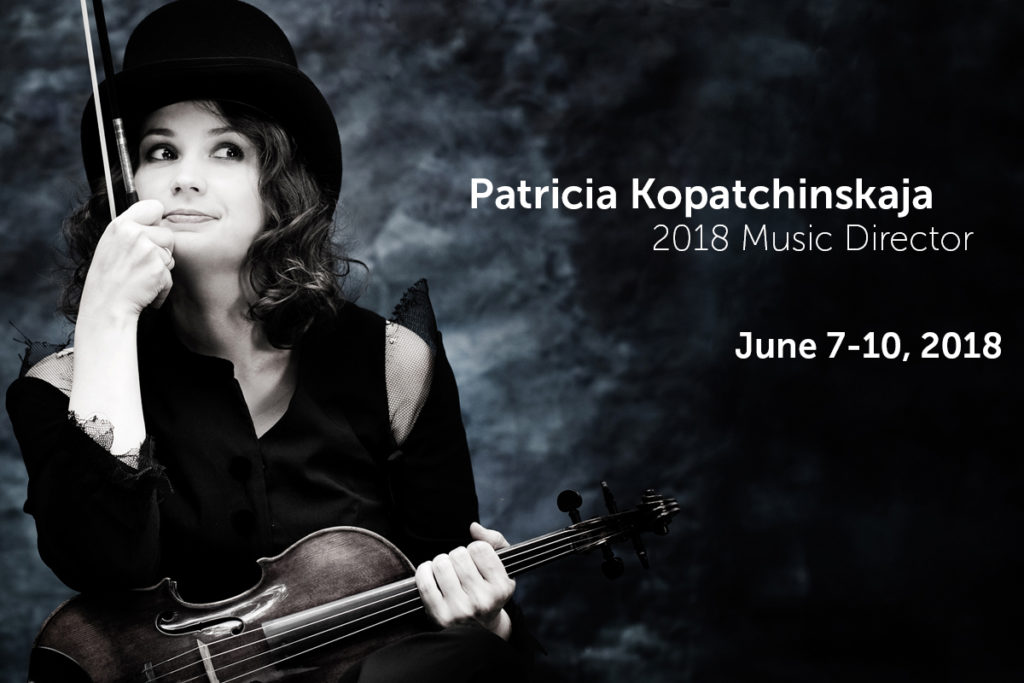
The 72nd Ojai Music Festival, June 7-10, 2018, presents Music Director Patricia Kopatchinskaja’s unbounded musical creativity and perspective in the context of today’s social and political climate.
The 2018 Ojai Music Festival welcomes the Mahler Chamber Orchestra (MCO) in its first extended United States residency. Founded in 1997, the Berlin-based MCO defines itself as a free and international ensemble, dedicated to creating and sharing exceptional experiences in classical music. With members spanning 20 different countries, the MCO works as a nomadic collective of passionate musicians uniting for specific projects in Europe and across the world. The MCO forms the basis of the Lucerne Festival Orchestra and maintains long and fruitful artistic relationships with major artists, including Ms. Kopatchinskaja and Mitsuko Uchida, Ojai’s 2021 Music Director. In Ojai, MCO will display its versatility and virtuosity as an orchestral ensemble, in smaller chamber iterations, and also in superb solo performances from individual members.
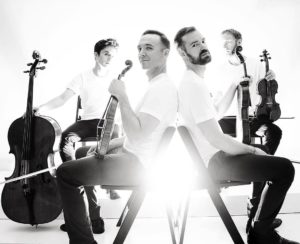 The JACK Quartet also makes its Ojai debut at the 2018 Festival. Deemed “superheroes of the new music world” (Boston Globe), JACK is dedicated to the performance, commissioning, and spread of new string quartet music. Comprising violinists Christopher Otto and Austin Wulliman, violist John Pickford Richards, and cellist Jay Campbell, the group collaborates with composers of our day, including John Luther Adams, Chaya Czernowin, Simon Steen-Andersen, Caroline Shaw, Helmut Lachenmann, Steve Reich, Matthias Pintscher, and John Zorn. Upcoming and recent premieres include works by Derek Bermel, Cenk Ergün, Roger Reynolds, Toby Twining, and Georg Friedrich Haas. At the 2018 Festival, JACK will perform works by Georg Frederick Haas, Horatio Radulescu, Morton Feldman, George Crumb and Jorge Sanchez-Chiong.
The JACK Quartet also makes its Ojai debut at the 2018 Festival. Deemed “superheroes of the new music world” (Boston Globe), JACK is dedicated to the performance, commissioning, and spread of new string quartet music. Comprising violinists Christopher Otto and Austin Wulliman, violist John Pickford Richards, and cellist Jay Campbell, the group collaborates with composers of our day, including John Luther Adams, Chaya Czernowin, Simon Steen-Andersen, Caroline Shaw, Helmut Lachenmann, Steve Reich, Matthias Pintscher, and John Zorn. Upcoming and recent premieres include works by Derek Bermel, Cenk Ergün, Roger Reynolds, Toby Twining, and Georg Friedrich Haas. At the 2018 Festival, JACK will perform works by Georg Frederick Haas, Horatio Radulescu, Morton Feldman, George Crumb and Jorge Sanchez-Chiong.
Major projects will include two semi-staged concerts conceived and directed by Ms. Kopatchinskaja. The first, which opens the Festival on Thursday night, is Bye Bye Beethoven. Kopatchinskaja describes the concert as a commentary on “the irrelevance of the classic concert routine for our present life.” This program features a mash-up of music by Charles Ives, John Cage, Joseph Haydn, György Kurtág, Johann Sebastian Bach, and the Beethoven Violin Concerto. This marks the US premiere of Bye Bye Beethoven, which was premiered at the Hamburg International Music Festival and subsequently staged in Berlin. This production marked the fourth collaboration between Ms. Kopatchinskaja and the Mahler Chamber Orchestra. Bye Bye Beethoven involves musicians in both conventional and unconventional roles, encounters with different musical genres – including a collaboration with sound designer Jorge Sanchez-Chiong – and discourse among sound, space and imagery.
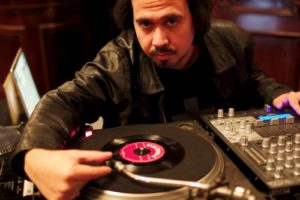 The second semi-staged concert conceived and directed by Ms. Kopatchinskaja is her own provocative commentary on the consequences of global warming. Titled Dies Irae, the program is an aesthetic reflection of a time rife with global warming, wars over resources, and refugee crises. Musical selections include Heinrich Ignaz Franz Biber, George Crumb, Michael Hersch, Byzantine chant, Giacinto Scelsi, and Galina Ustvolskaya’s remarkable Dies Irae for eight double basses, piano, and wooden box. The evening performance on Saturday, June 9, 2018 marks its American premiere.
The second semi-staged concert conceived and directed by Ms. Kopatchinskaja is her own provocative commentary on the consequences of global warming. Titled Dies Irae, the program is an aesthetic reflection of a time rife with global warming, wars over resources, and refugee crises. Musical selections include Heinrich Ignaz Franz Biber, George Crumb, Michael Hersch, Byzantine chant, Giacinto Scelsi, and Galina Ustvolskaya’s remarkable Dies Irae for eight double basses, piano, and wooden box. The evening performance on Saturday, June 9, 2018 marks its American premiere.
A new piece by American composer Michael Hersch – described by him as a dramatic cantata for two sopranos and eight instrumentalists – will receive its world premiere at the 2018 Ojai Music Festival, with subsequent performances at Cal Performances’ Ojai at Berkeley and at Great Britain’s venerable Aldeburgh Festival. The Friday, June 8, 2018 premiere follows works by Carl Philip Emmanuel Bach, Jorge Sanchez-Chiong, and piano music by Bull, Byrd, Purcell as well as improvisations. Mr. Hersch, who wrote a violin concerto for Ms. Kopatchinskaja two years ago, is considered one of the most gifted composers of his generation and is a formidable pianist. He currently serves on the composition faculty at the Peabody Institute of the Johns Hopkins University.
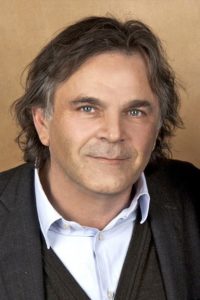 Featured on Friday afternoon (June 8) will be the music of Russian composer Galina Ustvolskaya, described by Alex Ross as “one of the century’s grand originals.” Kopatchinskaja has long been a passionate advocate of Ustvolskaya’s music and will perform with pianist Markus Hinterhäuser her Duet and Sonata. Hinterhäuser, who is also the Intendant of the Salzburg Festival, will perform all six of her piano sonatas. Ustvolskaya’s powerful Dies irae will be featured in the Saturday evening concert of the same title.
Featured on Friday afternoon (June 8) will be the music of Russian composer Galina Ustvolskaya, described by Alex Ross as “one of the century’s grand originals.” Kopatchinskaja has long been a passionate advocate of Ustvolskaya’s music and will perform with pianist Markus Hinterhäuser her Duet and Sonata. Hinterhäuser, who is also the Intendant of the Salzburg Festival, will perform all six of her piano sonatas. Ustvolskaya’s powerful Dies irae will be featured in the Saturday evening concert of the same title.
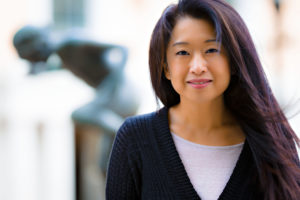 Additional programming highlights include Kurtag’s Kafka Fragments; Stravinsky’s L’Histoire du Soldat on the occasion of its centennial; major chamber and piano music by Galina Ustvolskaya; as well as Roumanian and Moldavian folk music performed by Ms. Kopatchinskaja and her parents, Viktor and Emilia Kopatchinski on cimbalom and violin. The Festival closes with the Ligeti Violin Concerto performed by Patricia Kopatchinskaja.
Additional programming highlights include Kurtag’s Kafka Fragments; Stravinsky’s L’Histoire du Soldat on the occasion of its centennial; major chamber and piano music by Galina Ustvolskaya; as well as Roumanian and Moldavian folk music performed by Ms. Kopatchinskaja and her parents, Viktor and Emilia Kopatchinski on cimbalom and violin. The Festival closes with the Ligeti Violin Concerto performed by Patricia Kopatchinskaja.
Free Community Concerts
The 2018 Festival continues to build on its commitment to reach broader audiences with several opportunities for all to experience Ojai offerings. On Thursday June 7, following the three-part Ojai Talks dialogues, the Festival commences the first in a series of six free pop-up concerts in the Gazebo of Libbey Park, featuring performances of most of Luciano Berio’s Sequenzas for solo instruments by members of the Mahler Chamber Orchestra. Patricia Kopatchinskaja and Jorge Sanchez-Chiong, electronics, will also perform Luigi Nono’s La lontanaza nostalgica utopia future in a free concert Thursday evening in Libbey Park, preceding the Festival’s first main Libbey Bowl concert of Ms. Kopatchinskaja’s semi-staged concert Bye Bye Beethoven. Additionally, Ms. Kopatchinskaja has programmed two free concerts just for children. Children of all ages will convene in the Ojai Art Center listen to works by Berio, Biber, Cage, Holliger, Arthur Honegger, and Ferdinand the Bull by Alan Ridout for solo violin and speaker. These concerts for children are presented in association with the Festival’s BRAVO education program for schools and community.
Ojai Talks
The 2018 Festival begins with Ojai Talks hosted by Ara Guzelimian, former Festival Artistic Director and current Dean and Provost of The Julliard School. On Thursday, June 7, a three-part series of discussions will begin with an exploration of Patricia Kopatchinskaja’s musical preferences and inspirations. The Ojai Music Festival’s march toward its 75th anniversary frames the second Ojai Talks, with reflections on its storied legacy, contextualization of its place on the world stage, and hints of what evolutions may impact the Festival in the future. The third part of the discussion series will speak to the reinvention of musical groups, with panelists from the JACK Quartet and from the Mahler Chamber Orchestra.
Additional on-site and on-line dialogue during the 2018 Festival includes Concert Insights, the preconcert talks at the LIbbey Bowl Tennis Courts with Festival artists hosted by resident musicologist Christoper Hailey. Preconcert interviews are broadcast through the Festival’s free live streaming program, hosted by content-expert individuals from across the nation.
Additional details for Ms. Kopatchinskaja’s 2018 Festival will be announced in the spring.
New Partnership with the Aldeburgh Festival
Following the 2018 Festival in Ojai with Music Director Patricia Kopatchinskaja and the following week’s Ojai at Berkeley presented in collaboration with Cal Performances, a new partnership with Aldeburgh will take place at the end of the Aldeburgh Festival (June 21 – 24) based at the acclaimed Maltings Concert Hall and in the town of Snape near Aldeburgh in England. The collaboration with Aldeburgh follows the formation of Ojai at Berkeley as a partnership of co-productions and co-commissions that affords the Ojai Music Festival, the Aldeburgh Festival, and Cal Performances the ability to present more complex and creative artistic projects than could be conceived by each partner separately. The Aldeburgh relationship launches in June 2018, for an initial four-year period.
Ojai at Berkeley
Marking the eighth year of artistic partnership, Ojai at Berkeley celebrates the dynamic nature of the Ojai Music Festival and of Cal Performances. As two distinct communities, Ojai and Berkeley are both known for intrepid artistic discovery, spirited intellect, and enduring engagement in the arts. Inaugurated in 2011, Ojai at Berkeley is a joint force that enables co-commissions and co-productions and allows artists to achieve more than could be imagined by each organization separately. Ojai at Berkeley will take place from June 15-17 in Berkeley, CA, following the Ojai Music Festival. For more information, visit CalPerformances.org.
2018 Festival series passes are available now and may be purchased online at OjaiFestival.org or by calling (805) 646-2053.
Congrats to Tyshawn Sorey: 2017 MacArthur Fellow Recipient
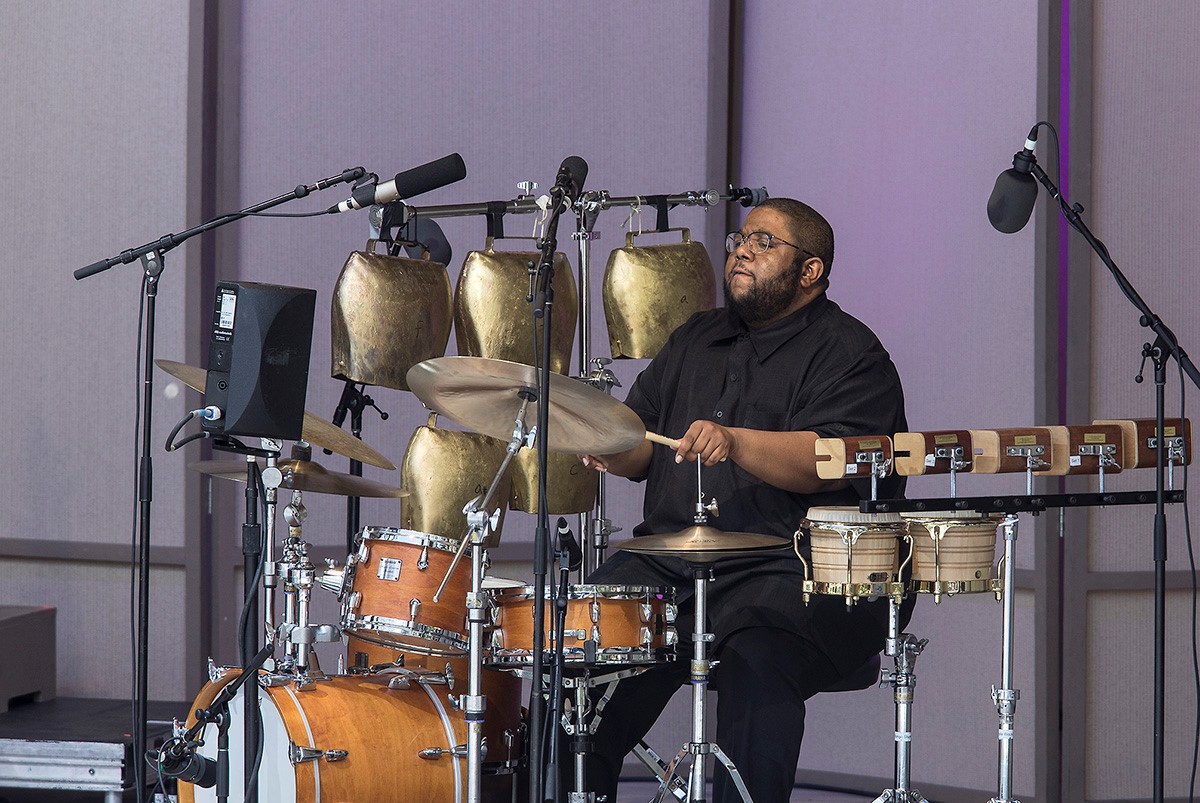
Congratulations to our friend and collaborator Tyshawn Sorey on his appointment as a MacArthur Fellow. Tyshawn’s astonishing creativity has been so evident in Ojai for the last two Festivals – 2016 with Peter Sellars and Julia Bullock, and in 2017 with Vijay Iyer (Sellars and Iyer are themselves MacArthur Fellows). Ojai is an incubator for artists and music, and we can all be proud to see these so honored and recognized with this exciting award. Wonderful and well-deserved news, Tyshawn.” – Thomas W. Morris
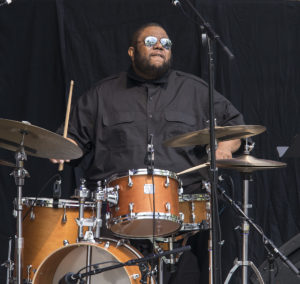
The MacArthur Foundation recently announced their Class of 2017 recipients popularly referred to as a “genius grant.” This esteemed list included two-time Festival alum Tyshawn Sorey. A release from The John D. and Catherine T. MacArthur Foundation cited Sorey for “assimilating and transforming ideas from a broad spectrum of musical idioms and defying distinctions between genres, composition, and improvisation in a singular expression of contemporary music.”
The Foundation website summarizes Tyshawn’s work:
A virtuosic percussionist and drum set player who is fluent in piano and trombone, Sorey is an ever-curious explorer of the nature of sound and rhythm, ensemble behavior, and the physicality of live performance. He erodes distinctions among musical genres as well as the line between composition and improvisation and incorporates sophisticated rhythmic and harmonic phrasing, highly prescribed improvisational sound worlds, and real-time experimentation with sound, among many other structural elements. At the same time, he possesses a refined sense of restraint and balance that allows him to maintain his own unique voice while bringing a vast array of musical settings to life. He explores various World and Eastern musical and philosophical concepts on his albums Koan (2009) and Alloy (2014), employing musical languages that range from slowly developing tonally and pantonally based music to free atonal pieces that contain irregular rhythms, lyrical phrasing, and distinctive pacing. Inner Spectrum of Variables (2015) features an extended composition in six movements that merges the harmonic and melodic vocabularies of Western classical, American, and Ethiopian creative expressions, free improvisation, and twentieth-century avant-garde musical traditions. In his song cycle Perle Noire: Meditations for Josephine (2016), Sorey reimagines the legendary Josephine Baker’s works; his original recreations of songs sung by Baker reflect both the context of her contributions to the civil rights movement and contemporary incidences of racial injustice. Sorey challenges expectations of jazz piano trio performance on Verisimilitude (2017), a set of five abstract, enigmatic, and austere pieces in which the delineation between spontaneous and formal composition is even more obscured.
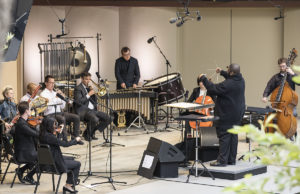 In addition to his own work as a composer, conductor, and ensemble leader, Sorey’s prowess as a percussionist and drum set player is well known, and he continues to be in high demand as a sideman for popular creative artists. With his genre-free approach to making music and continuous experimentation, Sorey is rapidly emerging as a singular talent in contemporary musical composition and performance.
In addition to his own work as a composer, conductor, and ensemble leader, Sorey’s prowess as a percussionist and drum set player is well known, and he continues to be in high demand as a sideman for popular creative artists. With his genre-free approach to making music and continuous experimentation, Sorey is rapidly emerging as a singular talent in contemporary musical composition and performance.
The Ojai Music Festival congratulates Tyshawn for joining the ranks of these creative and forward-thinking individuals. Read more here >
2017 Festival Reviews
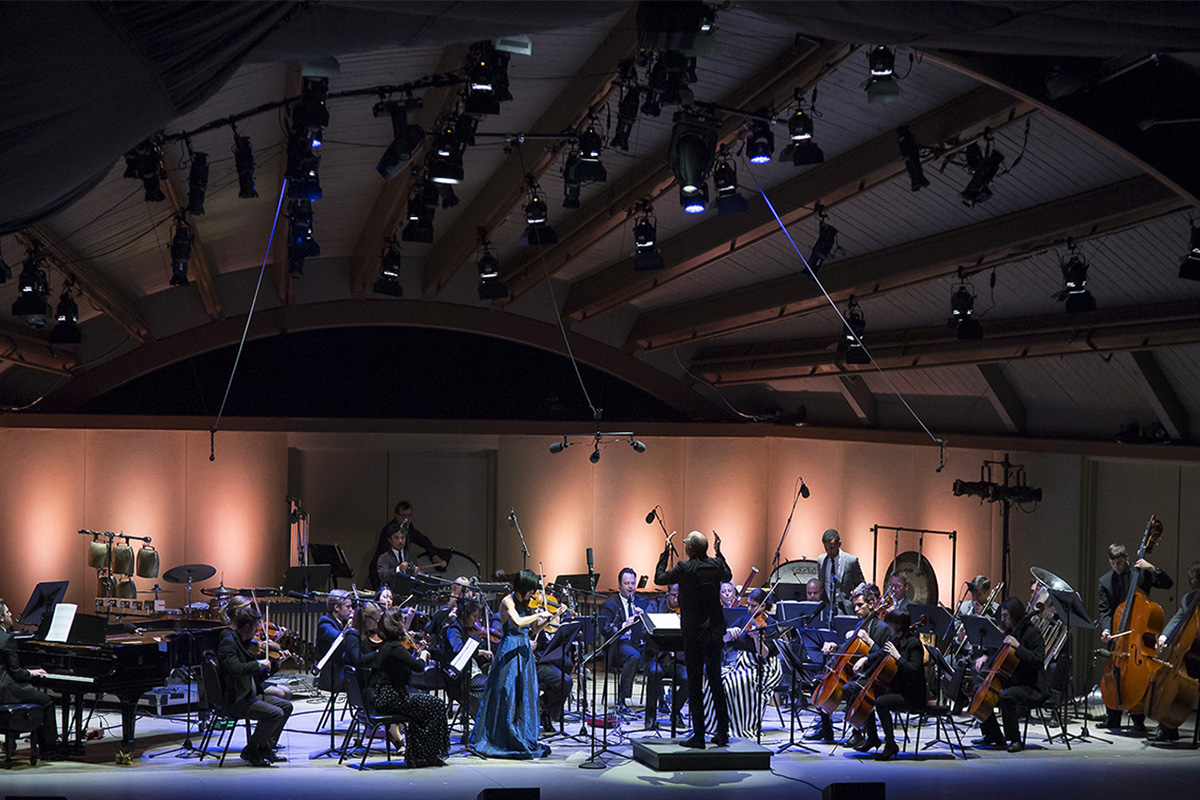
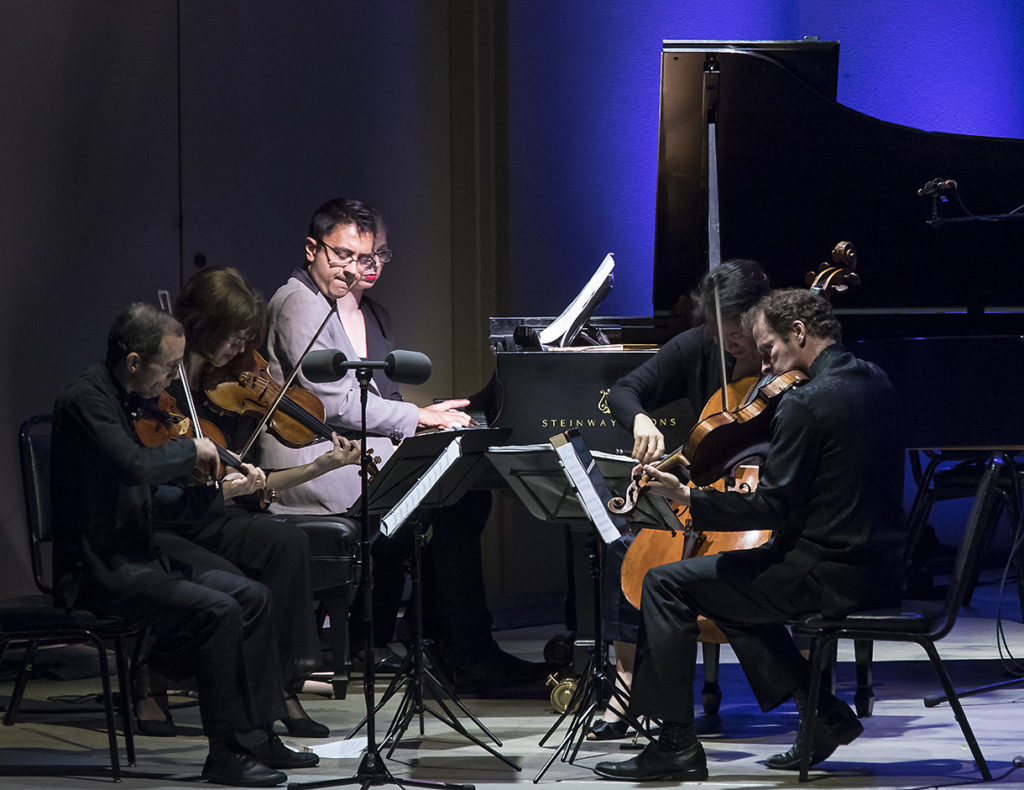
The 2017 Ojai Music Festival with Music Director Vijay Iyer embodied the spirit of the Festival with an openness to discovery and stretching musical boundaries. This year as Vijay expressed the 71st edition was an opportunity to bring various communities together. Relive the 2017 Festival anytime by watching our archived live streaming concerts on our You Tube channel.
Feedback from our audience, artists, and members of the press is important to us. Read review excerpts, which we will continue to update as press reviews come in, or download the PDF version here.
[Vijay Iyer] made a festival with a history of daring and risk-taking become more vital and daring than ever. – San Diego Union-Tribune
The compelling feature was in what appeared to be Iyer’s own quest to find examples of how to take the next step and make the music your own.
For that he brought some of the great masters of day, with special and illuminating attention on Chicago’s Association for the Advancement of Creative Music. Friday night, Iyer presented the West Coast premiere of George Lewis’ brilliant 2015 opera, “Afterword,” written to commemorate the 50th anniversary of AACM” – Los Angeles Times
Over the weekend, we heard Iyer in multiple settings. He showed his ever-deepening attributes as a composer, most notably in the impressive world premiere of his engaging Violin Concerto, “Trouble,” for style-flexible virtuoso Jennifer Koh (whose late-night solo concert “Bach And Beyond,” melding Bach, Berio and others, was a bold highlight of the weekend). – DownBeat magazine
Proving once again that for the truly fearless, nothing is impossible, the 2017 Ojai Music Festival effectively erased the boundaries between jazz, classical, traditional Indian music, and more over the course of four sound-packed days in and around Libbey Bowl. – Santa Barbara Independent
Improvisation and invention from two continents staked out new ground somewhere in between. Was it jazz? Maybe. But as a whole, this year’s gathering in Ojai thrived under its long-held, suitably broad umbrella of “music festival,” and an excellent, engrossing one at that. Ultimately, those are the only labels that matter. – Los Angeles Times
Sharing Ojai: Insider Tips for Festival Goers
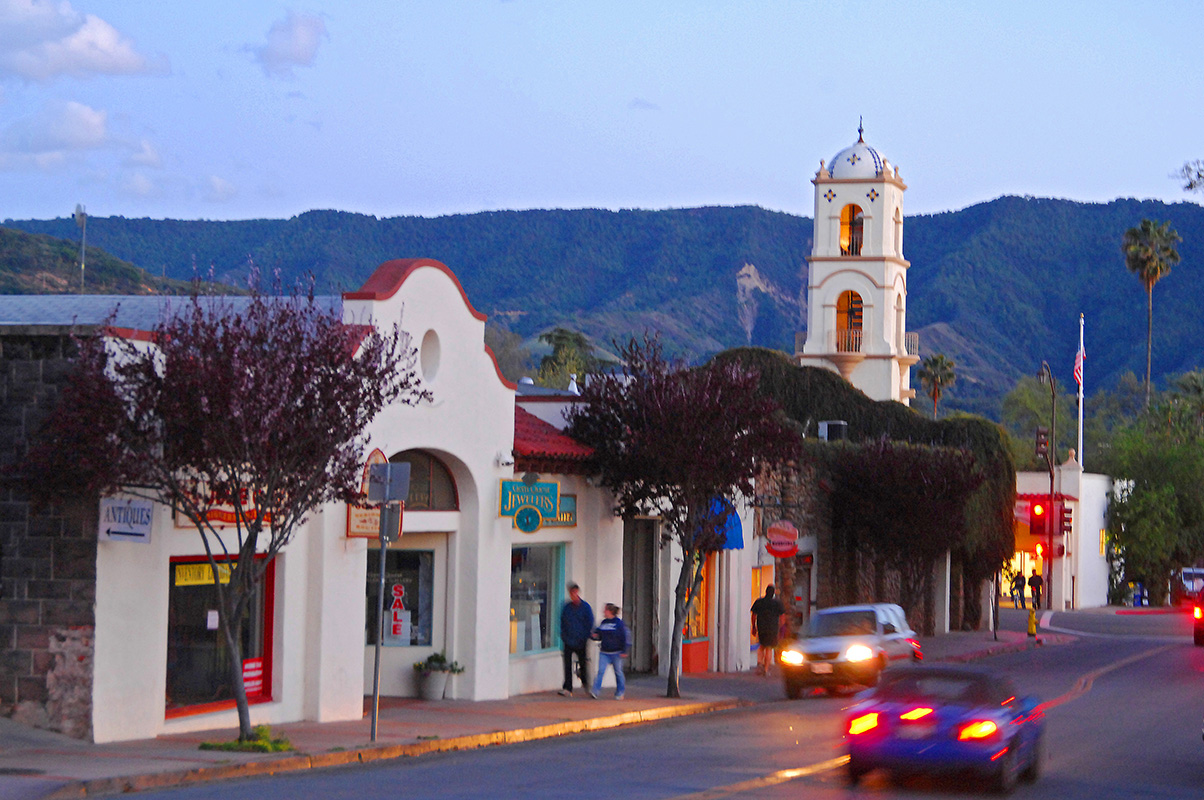
Freelance writer/fine art and antiques broker Leslie A. Westbrook covers Ojai and Ventura County for Ventana magazine and the Ventura County Reporter among other outlets.
She had been attending the Ojai Music Festival off and on for more than three decades. Her father – “under the radar” jazz pianist and composer Forrest Westbrook – joined her at the Festival during the later part of his life and became a fan as well. Leslie really wishes he was still alive to partake in this year’s jazzy fest— but he will be with her in spirit. We asked Leslie for some of her favorite spots and things to do in Ojai and she has a nice long list to share:
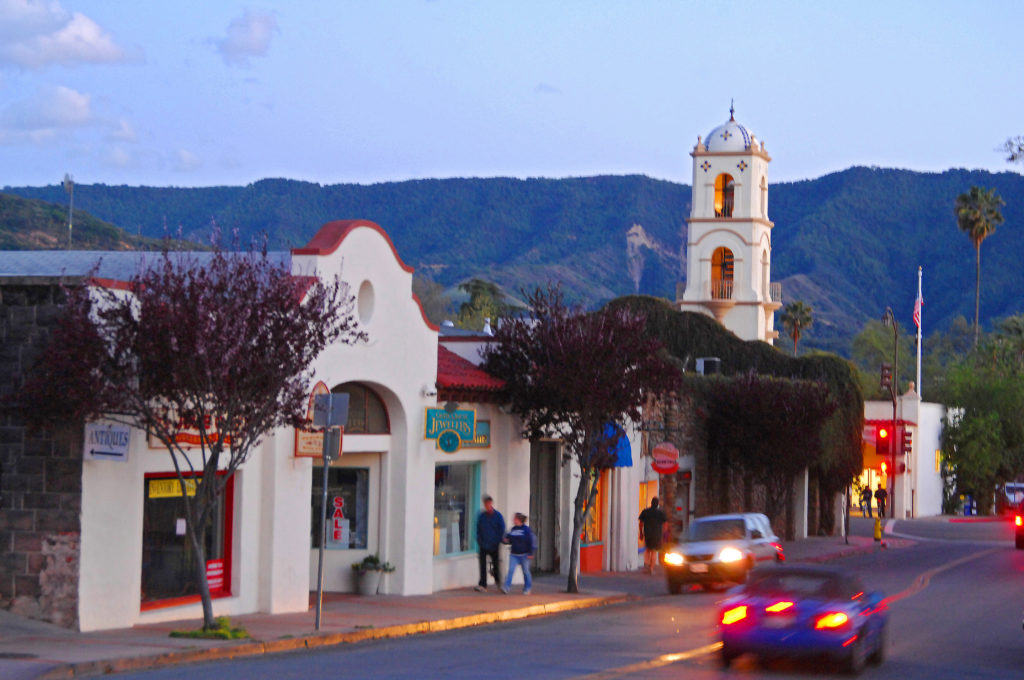
Music fans cannot live on music alone (well, almost) so what to do in-between concerts? Explore the valley and all it has to offer. Here are a few more reasons (as if you needed one!) to hit Ojai for the Festival this year.
EAT
For quick, casual but tasty Mexican, two hole-in-the wall spots popular with locals:
The pineapple tamales at La Fuente (tucked into the corner of a strip mall) are sweetly addictive, but there are six other flavors ranging from cheese and chili to corn or pork. Street tacos on homemade rosemary tortillas at Ojai Tortilla House satisfy – be prepared to wait in line and eat on the street (no tables here), or better yet, head to Libbey Park and grab a picnic table where you can also enjoy the Rio Negro II sound installation.

Quick nibble before the tennis court pre-concert chat and evening concert? Pop into Azu for tapas and beers. Looking for a great gluten-free meal – Food Harmonics is the new “kid on the block” right on the Arcade.
For a more leisurely meal, Suzanne’s is a long time favorite for concert goers (seafood entrees at dinner; salads at lunch); Nocciola is a wonderful alternative in town. Leave plenty of time so you don’t miss a concert to indulge in the tasting menus in this charmingly restored historic Craftsman bungalow – Bravo to owner/chef Pietro Biondi for bringing a tasty bit of Italy to Shangri-La.
DRINK
Wake UP! and smell the freshly roasted coffee sourced and roasted by the owners at Beacon Coffee Co. (new since last year’s fest) and a tasty savory or grab a cuppa java at longtime fave Ojai Roasting Co. The gigantic berry muffins at Ojai Café Emporium will hold you through morning concerts.
Midday refreshment? Grab a smoothie or healthy salads from the deli case at Rainbow Bridge – and people watch from a street side table.
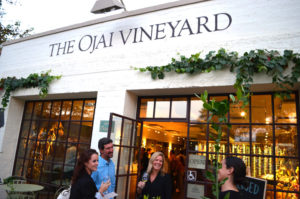
Pop in for a pre-concert wine tasting at The Ojai Vineyard tasting room – we’ve never had a bad wine from winemaker Adam Tolmach. At the Festival’s new “Pub in the Park” on Friday and Saturday night, Attitude Adjustment will have OV wines available for purchase.
PRAY/MEDITATE / CHILLAX
Ojai is famous as a spiritualist retreat and community, Krishnamurti lived here – visit the philosopher’s library and former home in Ojai’s East End. Or head to Meditation Mount for stunning views of the valley.
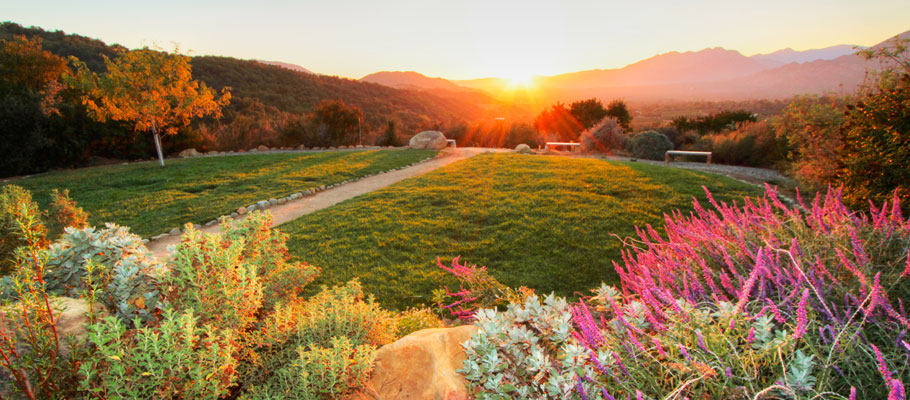
LOVE ART
From contemporary fine art to handmade pottery, Ojai prides itself on the talent in the valley. If you like what you see, plan to revisit Ojai during the annual Studio Artists Tour in the fall and visit studios and meet the artists.
The Porch Gallery shows cutting edge contemporary art, During the Festival check out its current exhibit – the Ojai Invitational 2017: “California Space & Light”, a collaboration with EMS Arts featuring selected works by Kelly Berg, Brad Howe, Andy Moses and Jennifer Wolf.
Ojai has an earthly side, too. Contemporary ceramics can be purchased at PSpace Pottery or take a drive up and over the grade to visit Ojai icon Beatrice Wood’s (1893-1998) pottery studio, who credited her longevity thusly: “I owe it all to art books, chocolates, and young men.”). We’d add good music.
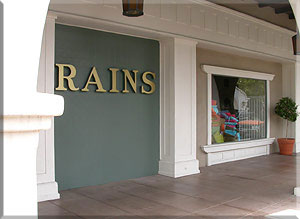
SHOP
De Kor & Co, is a great emporium for a mix of home wares, clothing and cool gifts. Rains is an old-fashioned department store and Ojai institution. Walk on through – for men and women’s clothing and a great kitchen department! Partake in olive oil tasting at former high fashion mode Carolina Gramm’s gorgeous shop – she flavors EVOO and vinegars as well with subtle flavors. Walnut balsamic vinegar is a fav, but find your own amidst the vast array.
STROLL
Don’t miss the Sunday Farmer’s Market – Mingle with locals and check out Ventura County’s rich cornucopia of flavorful, fresh organic produce. Nibble on popsicles in unique flavors (chili anyone?), chocolates made by a mother/daughter team, baked goods and other treats and you might even find Golden State papayas – who knew these tropical treats are raised in our region?
NATURE
Need to stretch? Hike Shelf Road – or take a drive 3 miles to stroll Taft Gardens to admire exotic and rare botanicals from Australia and beyond.
Last but not least, don’t miss Ojai’s famous Pink Moment – the magic glow at sunset that kisses the Topa Topa mountain range.
- Leslie A. Westbrook
2017 Ojai Music Festival Program Notes
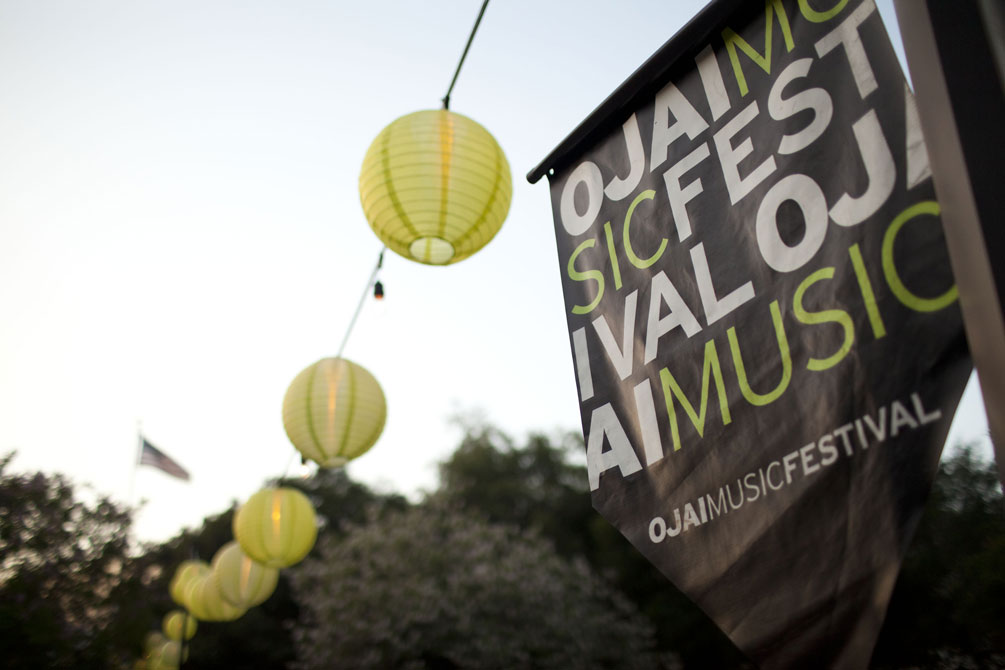

A Message from the Music Director
Thank you for joining us for these very special days and nights of music in Ojai. After two years of planning, we’ve somehow managed to gather dozens of my favorite artists: creative visionaries across generations, geographies, and histories, every one of them beyond category.
I am honored to be a featured composer and pianist throughout this Festival, but I’m even more pleased to report that it’s not all about me. You will find many other recurring themes over the weekend: improvisation and “real-time” music making; American experimentalism; radically inventive composer-performers; non-European musical systems; dialogue between the past and the present; collective struggles against racism and oppression; and central to all of this, the legacy of the Association for the Advancement of Creative Musicians (AACM).
You will recognize some performers and composers from past Festivals (Aruna Sairam, Tyshawn Sorey, Steven Schick, George Lewis, ICE), and you will meet others whose sounds are new to Ojai (Jen Shyu, Courtney Bryan, and myself). You will meet legendary elders (Zakir Hussain, Muhal Richard Abrams, and Roscoe Mitchell) and younger upstarts (Steve Lehman, Rudresh Mahanthappa, and Cory Smythe). You will hear state-of-the-art interpreters (Jennifer Koh, Brentano Quartet, Claire Chase, and Helga Davis) and wizardly real-time creators (Graham Haynes, Wadada Leo Smith, Nicole Mitchell, and Mark Shim). You will hear music as object—composed opuses, whether finished centuries ago or with ink still fresh—and you will hear music as process—the sonic choices of networks of actors moving in relation to each other and to their environment. And you might notice that—to some degree, every musical performance contains both of these elements.
By now you’ve probably heard or read my suggestion that we should replace the word “genre” with “community”—a very different word, concerned not with styles, but with people. I realize that the latter has become a no-less-hackneyed term, wishful and forced, invoked too often. With this distinction I only meant to point out a simple truth about music: In listening to each other, we become connected. When done with patience and compassion, listening can elicit recognition of the other as a version of one’s own self. This kind of empathic listening shakes us out of our habitual role as musical “consumers,” by reminding us that music is the sound of human action, and not a disembodied substance. It de-centers “the composer” as the primary actor in music, and reorients us instead towards the shared present: being together in time. Empathic listening begins to bring all of us in, music makers and observers alike, towards a shared purpose.
Here we find common cause with Judith Butler’s Notes Toward a Performative Theory of Assembly, her recent far-reaching meditations on the politics inherent in the act of gathering. When we, as assembled bodies, are able to theorize a common purpose—to reflect upon ourselves, or to dream together, if you prefer—that is the moment that we become political; that is when we are first able to unite around something larger than the self, deeper than aesthetic enjoyment, more urgent than mere curiosity. In this sense, I would add, the moment we commit to empathetic listening, to hearing one another as fellow human beings, we immediately have the potential for not just community, but equality and justice, through direct action and collective transformation. And I am certain that such moments, such purposeful shared presence—a power stronger than itself—will emerge, here, this weekend, with and among each other.
So I thank you, once again, for assembling, and for listening.
VIJAY IYER
Click here to read the 2017 Ojai Music Festival Program Notes
2018 Festival Highlights

“It’s like a dream to be able to play over the course of only a few days and hear my most beloved musical pieces of our time, and to share with the audience members of the most vibrant and progressive festival on the American continent – OJAI. These pieces changed my life – I hope they will also find a very special place in your souls,” Patricia Kopatchinskaja, 2018 Music Director.
The 2018 Ojai Music Festival welcomes the Mahler Chamber Orchestra in its first extended United States residency. The Mahler Chamber Orchestra was founded in 1997 based on the shared vision of being a free and international ensemble, dedicated to creating and sharing exceptional experiences in classical music. With 45 members spanning 20 different countries at its core, the MCO works as a nomadic collective of passionate musicians uniting for specific tours in Europe and across the world. Based in Berlin, the Mahler Chamber Orchestra forms the basis of the Lucerne Festival Orchestra and has long and fruitful artistic relationships with major artists, including Ms. Kopatchinskaja and Mitsuko Uchida, Ojai’s 2021 Music Director. In Ojai, the Mahler Chamber Orchestra will be featured both as an orchestral ensemble, and showcased for the solo and chamber music artistry of its members.
Major 2018 Festival projects include two staged concerts designed by Ms. Kopatchinskaja. The first is Bye Bye Beethoven, which she describes as a commentary on “the irrelevance of the classic concert routine for our present life.” This staged program features a mash-up of music by Charles Ives, John Cage, Joseph Haydn, György Kurtág, Johann Sebastian Bach, and the Beethoven Violin Concerto. Ms. Kopatchinskaja’s second semi-staged concert is her own provocative commentary on the inevitable consequences on the planet of global warming. Titled Dies Irae, the program includes music by Heinrich Ignaz Franz Biber, Michael Hersch, Byzantine chant, Giacinto Scelsi, and Galina Ustvolskaya’s remarkable Dies Irae for eight double basses, piano, and wooden box.
American composer Michael Hersch will premiere at the 2018 Ojai Music Festival a new piece described by him as a dramatic cantata for two sopranos and eight instrumentalists. It will then be performed at Cal Performances’ Ojai at Berkeley and at Great Britain’s venerable Aldeburgh Festival. Mr. Hersch, who wrote a violin concerto for Ms. Kopatchinskaja two years ago, is considered one of the most gifted composers of his generation and is a formidable pianist. He currently serves on the composition faculty at the Peabody Institute of the Johns Hopkins University. This new work is a co-commission by the Ojai Music Festival, Cal Performances Berkeley, the Aldeburgh Festival, and PNReview, the prominent British poetry magazine at which Mr. Hersch is artist-in-residence.
Additional programming highlights include Kurtag’s Kafka Fragments; Stravinsky’s L’Histoire du Soldat on the occasion of its centennial; major chamber and piano music by Galina Ustvolskaya; as well as Roumanian and Moldavian folk music performed by Ms. Kopatchinskaja and her parents, Viktor and Emilia Kopatchinski on cimbalom and violin. The Festival closes with the Ligeti Violin Concerto performed by Patricia Kopatchinskaja.
Series Passes for 2018 Ojai Music Festival
Advance 2018 series subscriptions can be purchased here.
Interview & Book Reading – Always the Music
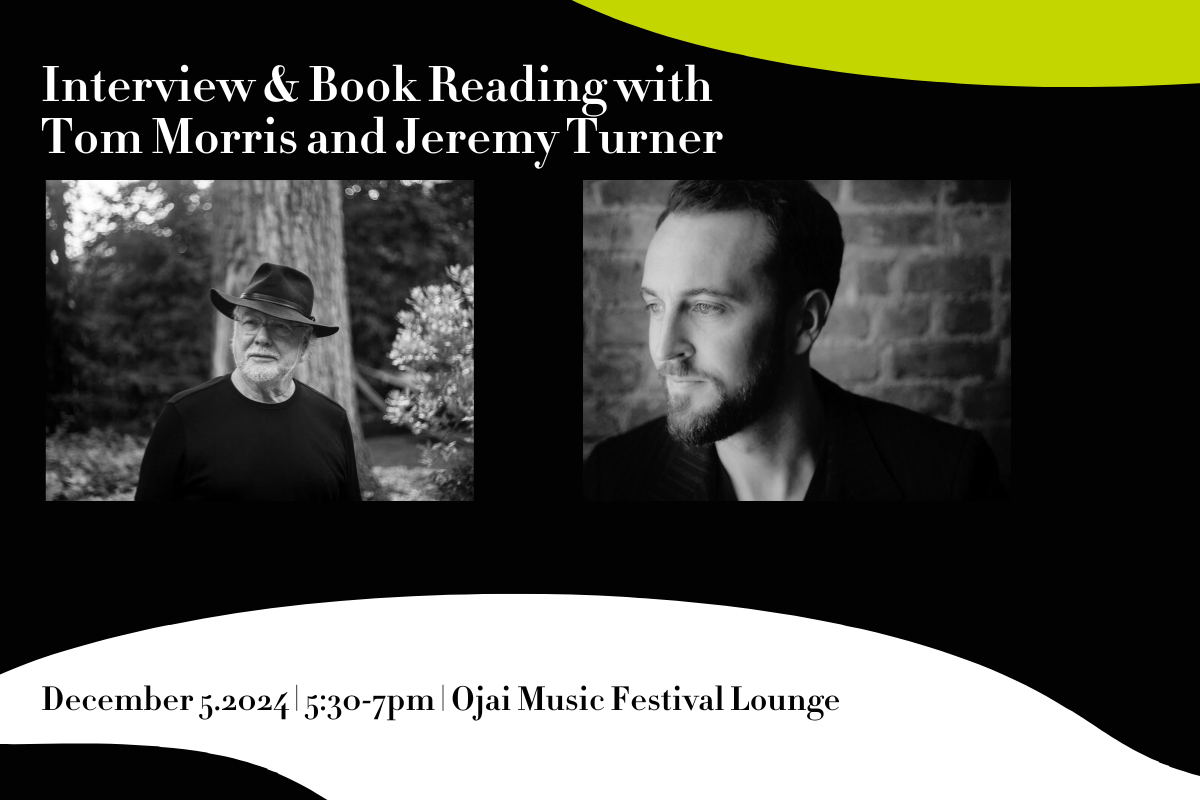
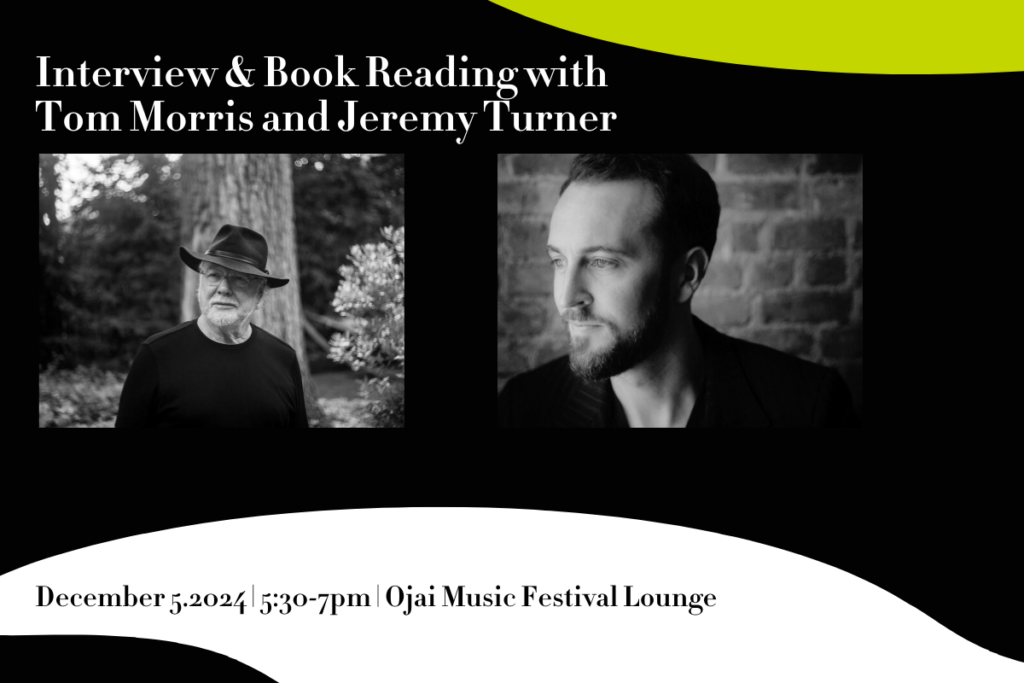
Join us for a special occasion featuring former Artistic Director Thomas W. Morris and now published author. “Always the Music” is the fascinating story of Tom Morris’ personal metamorphosis through the highest levels of the world of classical music, his learning and insights into how storied musical institutions function, great artists create, and audiences engage. The final chapter synthesizes Morris’ career lessons into an unequivocal but thoughtful prescription for the American orchestra. Mostly, though, this is the entertaining story of one man’s lifelong love affair with great music and the people who make it.
THU December 5.2025 | 5:30-7PM | Ojai Music Festival Lounge (201 S. Signal Street)
5:30PM: Enjoy a complimentary wine bar
6:00PM: Book reading and interview with Tom Morris and host Jeremy Turner, followed by a book signing.
We look forward to sharing this special evening with you!
This event is free to Ojai Music Festival friends. Limited seating. RSVP by clicking the link below.
About Thomas W. Morris
Thomas W. Morris had a distinguished career in the music business, having long service as chief executive of the Boston Symphony and Cleveland Orchestra, as well as artistic director of California’s Ojai Music Festival. His work in Ojai was highly recognized for the span and creativity of programming, as well as the breadth of artists with whom he collaborated.. He was one of the three founding partners of Spring for Music, an innovative orchestra festival held at Carnegie Hall from 2011 to 2014, and he has consulted nationally and internationally with over 75 orchestras and performing organizations. With a Bachelor of the Arts degree from Princeton University, as well as an MBA from the Wharton School, Morris is well versed in music, finance, marketing, fundraising, management and leadership. He is frequently sought out by major media as an expert to comment on music business issues of the day and has been featured in The New York Times, The L.A. Times, The New Yorker, and more. A percussionist, he has performed extensively in Boston Symphony, Boston Pops and the Blossom Festival Band. Thomas W. Morris | About
About Jeremy Turner
Composer, conductor, and multi-instrumentalist Jeremy Turner is known for creating innovative and diverse music for the moving image and the stage. He is a two time EMMY® nominee, has won the Music + Sound Award, an ASCAP Screen Music Award, an International Documentary Association Award, the AICP Award, and has been listed in NPR Music’s Favorite Songs of the Year. Jeremy regularly writes film and television scores for Disney+, HBO, Netflix, MAX, and Hulu; simultaneously creating concert music and composing for collaborative installations. Recent works include the score for the upcoming MRC film Let’s Have Kids!, directed by Adam Sztykiel; Shorebirds, a piece for solo violin premiered by Simone Porter at Lotusland in Montecito, California; and The Coast of Industry (2024), an art installation that recently opened at MASS MoCA.Performing throughout North America, Europe, and Asia, Jeremy has participated in the music festivals of Aspen, Ravinia, Tanglewood, Seattle, La Jolla, Moab, Sarasota, Interlochen, and Music at Plush. He has conducted twice at the LACMA Art + Film gala, has performed collaborations for Saint Laurent and Dolce & Gabbana, and conducted in New York’s Central Park for Ralph Lauren’s 50th Anniversary.
As a composer, his music has been heard around the world, from Carnegie Hall to the Sydney Opera House. Noted works include The Inland Seas, composed for violinist James Ehnes and mandolinist Chris Thile and commissioned by the Seattle Chamber Music Society; Suite of Unreason, a commission from the Music Academy of the West for their 70th Anniversary season; and a choral work for the Brooklyn Youth Chorus, commemorating the 50th anniversary of Wave Hill in New York. He has written music for The Jack Quartet, yMusic Ensemble, Brooklyn Rider, and Flux Quartet, as well as five installation pieces with the artist Chris Doyle. Jeremy Turner Studio
Meet our 2023 Interns
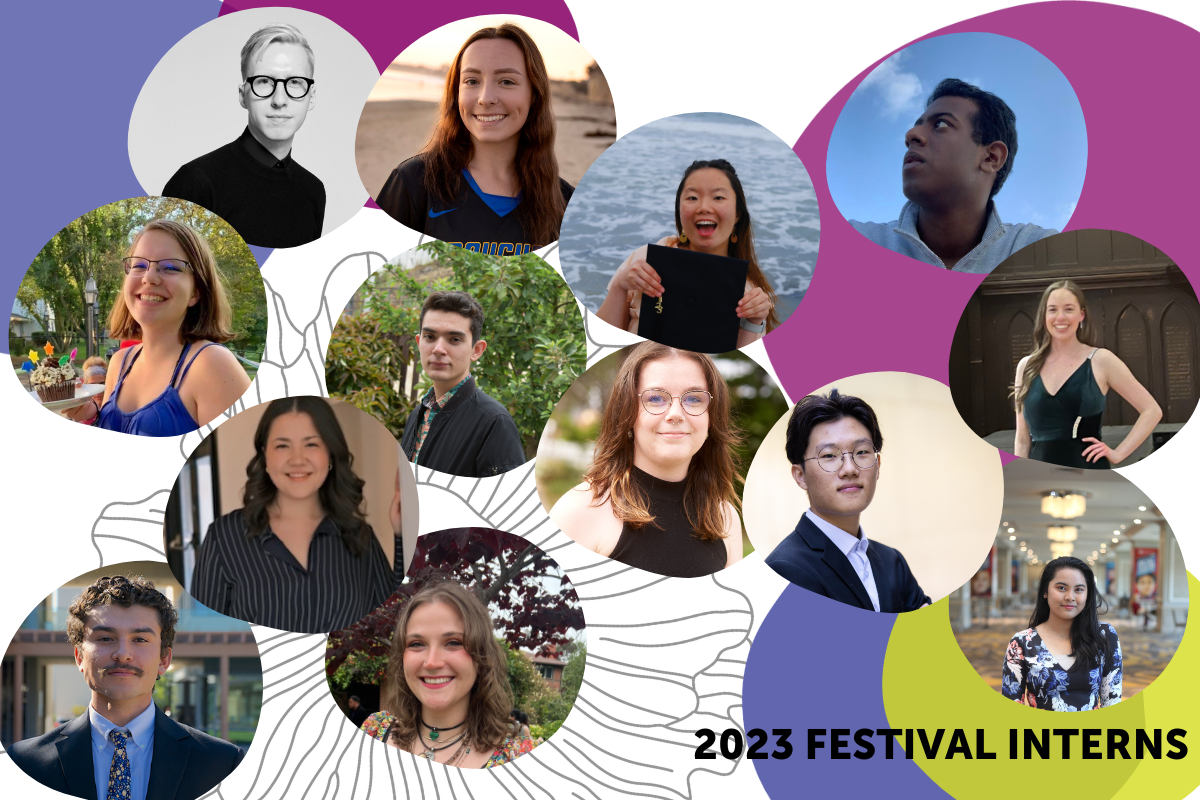

We are excited to share our stellar team of interns with you. These students represent the next generation of musicians and arts administrators. The Festival depends on them for critical support in a variety of management areas including production, stage management, front of house, operations, box office, marketing, and more. Our impressive roster of interns is ready to bring their passion and experience to the Ojai Music Festival team and make the 77th Ojai Music Festival a year to remember.
Hitesh Benny
Hitesh Benny is a student transferring to the University of California, San Diego to study Music and Economics. He is the Front of House Intern at this year’s Festival. Over the past two years, Hitesh has attained associate degrees in Music and Economics from Moorpark College. He has been a part of various ensembles including the Moorpark College Concert Choir, Symphony Orchestra, and the Come Together Ensemble. In the choir, he served as a student conductor, leading them in their Fall and Winter concerts. In the Symphony Orchestra, he also served as the percussion section leader and had transcriptions performed and recorded by the ensemble. Through the Come Together Ensemble, he premiered his compositions. Hitesh was fortunate to have been mentored by Richard Danielpour, the head of composition at UCLA. Hitesh has a steadfast dedication to helping small businesses in his community. Through these experiences, he earned various entrepreneurial and managerial lessons. He also remains committed to the musical community by serving as a volunteer at the Hear Now Festival, the Music Academy of the West Summer Festival, and the Ojai Music Festival.
Elizabeth (Liz) Callahan is a violinist who grew up in Ventura, California and began playing violin at the age of 10 at a children’s string ensemble at her church. Elizabeth has played violin in numerous ensembles including the Ojai Youth Symphony, Ventura High School Honors String Orchestra, and the Westmont College Orchestra. She thoroughly enjoyed the opportunity to perform during the orchestra tour to Austria and Prague as Principal violinist and as a selected soloist. Elizabeth is so grateful to have studied classical violin with fantastic faculty members including Dr. Han Soo Kim and Professor Isaac Kay, and traditional Irish violin technique with Grammy- and Emmy- nominated Celtic violinist, Máiréad Nesbitt. Elizabeth has participated in Westmont College Choir and she has had the opportunity to be an Assistant Conductor for the College Choir and the Santa Barbara Youth Symphony while studying conducting with Dr. Daniel Gee. She has been actively involved in music education in Santa Barbara while being Personnel Manager for the Santa Barbara Youth Symphony. Elizabeth will graduate from Westmont College in May 2023 with a Bachelor of Music Education and will continue to pursue a career in music education.
Eliana Choi is a recent 2023 Westmont College graduate who majored in psychology and minored in kinesiology and music. She utilized her minor in music to become on of the box office interns again at the Ojai Music Festival. Eliana is back in the Ojai intern family because she had a fabulous time with the staff, performers, volunteers, and interns last year (#RunningAMOC2022). Eliana specifically cherished working on Festival mobile app and updating the Festival website while at the box office. In her free time, Eliana enjoys playing video games, working out, and practicing her acoustic guitar and violin. She will pursue a doctoral degree in occupational therapy at Keck Graduate Institute in late August. Eliana is open to answering any questions and hopes that everyone will enjoy their time at the Festival!
Mia Condon has worked as a Stage Manager for the past four years. Throughout her experience, she has sought out positions that allow her to experience new genres of live entertainment and learn new strategies which she can utilize in future endeavors. She has a background in vocal and instrumental music in multiple genres and has a deep love for music, especially that which has a connection to things greater than and deeper than the individuals creating it. She Is incredibly excited to have the opportunity to experience Ojai for the first time and looks forward to engaging with everyone involved! Currently, Mia attends CalArts in Santa Clarita, CA.
William Jae is a composer and pianist raised in Los Angeles, California. William’s music can be described as both chaotic and sublime. His openness to learn new kinds of music allowed him to push the limits of what he can do with his own music. Between 2019 to 2020, he was a fellow at the Nancy and Barry Sanders Composer Fellowship Program, where he studied with renowned composers such as Andrew Norman, Sarah Gibson, and Thomas Kotcheff. It was during this time that he first experienced the world of contemporary classical music. In 2019, his string trio composition, “Alabaster Wool”, premiered at the Walt Disney Concert Hall and was performed by members of the Lyris Quartet. When the COVID-19 pandemic began in 2020, he received the Jack Kent Cooke Young Artists Award and made an appearance at Blanket Fort 2 hosted by Peter Dugan at From The Top. He was also the semi-finalist in the 2020 ASCAP Morton Gould Young Composers Award that same year. William is currently a junior at the Eastman School of Music pursuing a dual degree in music composition and psychology at the University of Rochester. Outside of the classroom, he is the artistic director of the Eastman Chamber Orchestra. During his free time, William enjoys spending time with his friends and colleagues as well as exploring various film and video game genres.
Sophie Little is currently pursuing a BA in Theater Technology and a minor in Music Technology at Chapman University, strongly focusing on sound engineering and theater design. Furthering this passion, she hopes to apply her knowledge and love for music by designing and assisting with sound for music festivals and concerts in the future. In the past, Sophie has been involved in countless productions throughout high school and college, most notably being her involvement with various music festivals in her home state of Michigan. Most recently, Sophie worked as the Sound Engineer and Designer for Chapman’s student-run production of It Shoulda Been You by Brian Hargrove. Sophie is very excited to join the Ojai Music Festival team as a sound intern and continue growing her love and knowledge of sound.
Niav Maher is a virtuosic soloist spanning several musical genres, combining personal sensitivity with insightful interpretation. She has been the recipient of many scholarships throughout her career at the Longy School of Music, New England Conservatory Prep, and Manhattan School of Music. Niav received the Michael B. Packer Scholarship of Excellence in Piano Studies at the Longy School of Music. From 2012-2019, Niav studied with Jonathan Bass at the New England Conservatory Preparatory School. In 2016, Niav was the first-prize winner of the NEC Preparatory Concerto Competition playing the Mendelssohn Concerto No.1 and went on to perform in Jordan Hall with the NEC YSO. She has participated on scholarship in NEC Prep tours through Germany, Italy, and Norway as a soloist, and orchestra member. In 2019, Niav received the Seth Kimmelman Scholarship given to a NEC Prep student who combines a commitment to the piano with intellectual curiosity. She then received the Piano Department award upon graduation.
Most recently, Niav was a winner of the Lillian Fuchs Chamber Music Competition at Manhattan School of Music. Niav holds a Bachelor of Music Degree in Classical Piano Performance from Manhattan School of Music where she studied with Daniel Epstein on the Glen K. Twiford Piano Department Scholarship. At the recommendation of the faculty, the Provost of MSM selected Niav as the recipient of the Helen Cohn Award, which is given upon graduation to a pianist in recognition of outstanding work in chamber music. Niav will begin her Master of Music Degree this fall, studying with Daniel Shapiro at the Cleveland Institute of Music.
Meet Diego Martinez, a talented musician, and audio engineer based in Chula Vista, California. Currently pursuing a Bachelor’s degree in music technology, Diego is dedicated to building a career in music composition and audio engineering. His coursework has given him a deep understanding of the technical aspects of music production, from recording and mixing to mastering and post-production. He is eager to apply his knowledge to real-world scenarios and is excited to learn from experienced professionals in the industry. As an accomplished artist, Diego has released several singles, collaborations, and three albums under his stage name, P-Wave. His hard work has paid off, as two of his albums have even received physical cassette releases – one independently, and the most recent under the popular indie music label, Stratford Ct.
Diego’s dedication to mastering his craft is evident in his constant pursuit of knowledge. He is always on the lookout for opportunities to learn and grow, attending conferences and workshops and seeking out mentorship from industry experts. In addition to his musical talents, Diego has honed his communication and networking skills, which have proven invaluable in his career. With his exceptional talent, dedication, and drive, Diego is sure to make significant contributions to any organization he is a part of, including the Ojai Music Festival sound department.
Mariah Divianne Musni is an undergraduate student pursuing Interdisciplinary Computing for the Arts and Music (ICAM) at the University of California, San Diego. Moving from the Philippines to the United States at 16, she sought new opportunities and personal growth. At UCSD, she combines her love for technology and artistic expression. This program allows Mariah to explore the convergence of computation, art, and music, pushing the boundaries of creativity and innovation. Through immersive coursework, she develops technical skills while nurturing her artistic sensibilities to create transformative experiences. As a novice audio intern at KSDT, the campus radio station, Mariah gained valuable hands-on experience in setting up audio equipment for live events, ensuring seamless sound quality.
Mariah’s passion for the arts originated in the Philippines, where she actively participated in dance and choir competitions. These experiences honed her creativity, discipline, and admiration for the performing arts.With a diverse background, unwavering determination, and a passion for innovation, Mariah aims to make a profound impact in ICAM, Speculative Design, and beyond. Mariah is committed to shaping the future of interdisciplinary creativity, pushing the boundaries of what is possible.
As a Junior at the University of California Los Angeles, Dani Nollenberger is currently pursuing a major in Music History and Industry Studies. Passionate about music, Dani has a deep interest in both performing and writing music. In addition to their musical pursuits, Dani is also dedicated to bringing excellent live music experiences to others and sharing the joy of music with those around them. With an unwavering commitment to the world of music, Dani has refined her skills and is working towards a career in the music industry. Dani plans to apply her knowledge and passion to make a meaningful impact in the world of music and her community.
Margaret Rodenburg is a flutist and 2023 Bachelor of Music major graduating with Highest Honors from the University of California, Santa Barbara where she studied Flute Performance with Jill Felber. A native of Seattle WA, Margaret began playing flute at age 9, and has since found immense joy in the musical ensembles and communities throughout her life, including the Seattle Rock Orchestra, Seattle All-City Marching Band, Seattle Collaborative Orchestra, UCSB Wind Ensemble, UCSB Flute Choir, and UCSB Chamber program. While her musical journey began as an instrumentalist, Margaret has both volunteered in and taught private flute lessons to beginners in the greater Seattle and Santa Barbara areas and has worked in a variety of administrative positions in the UCSB Music Department. Throughout her time in undergrad, Margaret has recognized that her passion for playing music will continue to be bolstered by community ensembles and individual experimentation and that her desire for a long-term role in the live music industry is actually one backstage—she hopes to soon enter the industry in a managerial, administrative or organizational capacity.
Baritone and Arts Administration leader, Kevin Spooner, is pursuing a Master of Music in Vocal Performance at the A.J. Fletcher Opera Institute of the University of North Carolina School of the Arts. Kevin received his Bachelor of Music in Vocal Performance from the Eastman School of Music and has performed a diverse breadth of roles in the operatic repertoire ranging from Mozart to Sondheim. During his time at Eastman, Kevin worked as an Admissions Ambassador, where he was responsible for guiding musicians and their families during their visit to ensure a comfortable and rewarding time at Eastman.
Passionate about non-profit organizations and presenting recitals, in 2018 Kevin organized and produced a recital featuring local musicians and himself to raise money for The Great Swamp Conservancy in Canastota, NY. Kevin is also performing a recital entitled Songs and Arias of Love the week before the Ojai Music Festival in his hometown of Oneida, NY.
During the 2022/2023 season, Kevin made his professional debut as Marchese D’Obigny in Verdi’s La Traviata with Piedmont Opera. Kevin also performed the role of Rodomonte in Joseph Haydn’s Orlando Paladino with the A.J. Fletcher Opera Institute in February. Last summer, Kevin performed the role of Schaunard in Puccini’s La Bohème with Opera Steamboat and performed the role of Paul’s Father in Gregory Spears’ Paul’s Case with the Ad Astra Music Festival. Outside of the arts, Kevin enjoys running, tennis, golf, and reading Stephen King novels.
As a pianist, producer, and composer, Mateo Thacher is pursuing a dual degree in Economics and Music at Claremont McKenna College. Throughout college and high school, he has engaged in a number of musical interests including music production and live performances. A member of the Pomona College Choir, Mateo is working on an arrangement for his second original fashion show soundtrack. In the winter of 2018, he began making music with his hometown friend here in Ojai, California and continues to publish music under the name Krandank, which is accessible on all streaming platforms.
Aside from his creative endeavors, Mateo manages a team of student research analysts at the Roberts Environmental Center. We focus on consulting and providing research analytics for clients across all fields of sustainability and environmental education. He hopes to continue his interest in music, economics, and the environment in his career, seeking a life that blends his many passions. In his spare time, Mateo loves to surf, climb, work out, skate, and get together with friends and family.
Landon Wilson is a pianist and arts administrator based in New York City. He is the Artistic Associate of AMOC* (American Modern Opera Company) and studies at Manhattan School of Music as an undergraduate President’s Award recipient. Landon’s interests in creating interdisciplinary and socially-confrontational work have led him to develop THE RASA PROJECT, an artificially intelligent, generative piece responding to the climate crisis through music by John Cage, Reena Esmail, and inti figgis-vizueta. Uniting a creative team of musicians, software engineers, neuroscientists, and visual artists from Manhattan School of Music, Columbia University, Royal College of Art (London), and Tsinghua University (Beijing), THE RASA PROJECT will premiere in October 2023 at National Sawdust as part of their 2023-24 Emerging Artists Series.
With AMOC*, Landon has worked with venues such as The Cathedral of St. John the Divine, The 92nd Street Y, The Clark Art Institute, Tina Kim Gallery, and Baryshnikov Arts Center. In the 2022-23 season, he produced an ‘Up Close’ collaboration between AMOC* and Ensemble Connect at Carnegie Hall featuring the quiescent, evocative work of the Wandelweiser Collective.
Residing at International House New York, Landon received the Thea Petscheck Iervolino Foundation Award and is developing a lecture panel with Peter Sellars about finding hope for the future in a post-pandemic world. He returns to the Ojai Festival as the 2023 Steven Rothenberg Production Fellow after interning in Public Relations and Marketing last summer.
Ojai Recipes

In an effort to evoke some of the experience we all love and are missing at this moment, we are sharing a few recipes from wonderful Ojai restaurants and chefs. Click the tabs below.
Stone Fruit and Tomato Gazpacho
Stone Fruit and Tomato Gazpacho
By Scott Daigre and Jenn Garbee
Ingredients
1 pound peaches or nectarines, peeled and cut into small chunks
1 large slicing cucumber or 3 small Persian cucumbers, peeled and cut into small chunks
½ medium red onion, roughly chopped
1 small jalapeno pepper, seeded and roughly chopped to taste
2 pounds juicy tomatoes, cut into chunks, plus 1 medium ripe tomato for serving
1 tablespoon extra-virgin olive oil, plus more for serving
1-1/2 tablespoons cider vinegar
2 tablespoons freshly squeezed lime juice, more to taste
Kosher salt and fresh ground black pepper
6 lime wedges, for serving
2 tablespoons chopped basil or parsley, both if you have them
Directions
- Place ¼ cup each of chopped peaches and cucumbers, 2 tablespoons red onion, and 1 teaspoon of jalapeno in a small bowl. Cover and refrigerate until ready to serve.
- Place the 2 pounds of tomatoes, remaining peaches, cucumber, red onion, and jalapeno in a blender and puree until the gazpacho is as smooth as you’d like. (If you have a small blender, you may need to do this in batches.) Pour the gazpacho into a large bowl and add the olive oil, cider vinegar, lime juice, and a ¾ tsp. each of salt and pepper. Chill for at least two hours or overnight. Taste again after chilling and add additional lime juice, salt and pepper to taste.
- To serve, finely dice the reserved peaches, cucumbers, red onion, jalapeno, and remaining tomato. Add the basil or parsley (or both), mix to combine, and season with salt and pepper to taste. Ladle the chilled gazpacho into bowl, top with tomato-peach salsa, and drizzle with olive oil.
Prime pick: use juicy tomatoes such as Jaune Flamme, Red Boar, Missouri Pink Love Apple, or Chocolate Stripes!
Learn more about Scott Daigre and Tomatomania: https://www.facebook.com/TomatomaniaHQ/
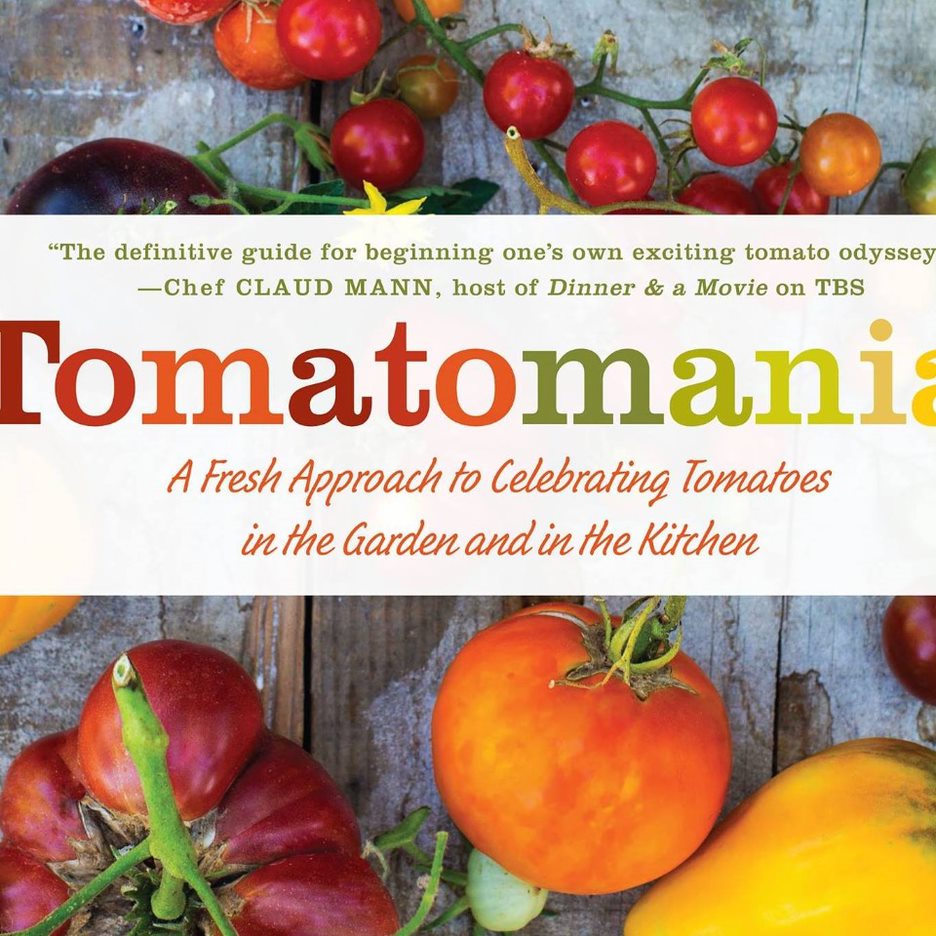

Chili Garlic Shrimp

GAMBAS AL AJILLO (CHILI GARLIC SHRIMP) 
By Azu
Ingredients
10 shrimp, shelled and veined, tails on.
1 tablespoon olive oil
1 tablespoon crushed garlic
1 tablespoon chopped parsley
3 tablespoons butter
1/8 teaspoon red chili flakes
1/4 cup white wine
Directions
- In medium hot pan heat olive oil then add shrimp.
- Sauté 1 minute, flip shrimp.
- Add garlic and chili flakes, sauté 1 minute
- Add white wine and butter, simmer 1 minute
- Add chopped parsley
Plate in a bowl and serve with sourdough
Serves 2
About Azu
Azu was incorporated in November 2000 by Laurel Moore. She bought Bill Bakers bakery at the same time. Azu opened its doors in early 2001.
Laurel was inspired by her many trips to Spain and Italy. Azu started small, the original idea was fresh baked bread, panini and gelato. Soon after opening for just breakfast and lunch, Laurel was asked repeatedly to be open for dinner. She converted some old baking space into the dining room.
Executive Chef and Owner Laurel Moore is the driving force behind Azu restaurant and a style of food critics have called lively, inventive, and comfortable all at once. A veteran of Hollywood, Chef Moore travelled the world as a still photographer, working on such films as Pretty in Pink and The Big Red One. Establishing Azu in 2001 Chef Moore undertook a singular vision, to take the best of what the world has to offer, and translate it through a locally sourced, regionally relevant palate.
Daughter of Laurel and General Manager, Elizabeth Haffner, joined Azu in 2006. Having worked as a costume designer for film in Los Angeles and abroad, Elizabeth journeyed to Ojai, CA to join her mother in creating a unique destination restaurant, on par with her adventurous tastes, and at home in the magical valley of Ojai. Elizabeth tirelessly executes her vision of quality and service on a daily basis, making Azu a true experience in simple elegance.
Jeremy Haffner, Husband to Elizabeth, in a joint venture with Laurel founded Ojai Valley Brewery in 2015. Previous to becoming the Brewmaster and building a nano brewery Jeremy toured the world with his rock band, Oedipus. Jeremy was also the gelato master and a chef at Azu restaurant throughout the years in between touring. He has brought his incredible palate and artistic vision to the Brewery which focuses on local foraged and farmed ingredients with beers designed to enjoy in the hot Ojai climate.
Sourdough Bread
Claud Mann’s Ojai Rotie Sourdough Bread 
(Special for Friends of The Ojai Music Festival)
For the Leaven:
- 100 grams each bread flour and whole wheat flour
- 200 Grams filtered water
- Recently fed sourdough starter (Get it free from Ojai Rotie!)
For the Bread 
- 250 grams mature leaven (from above)
- 800 grams organic bread flour or all-purpose flour
- 150 grams organic whole-wheat flour or whole spelt flour
- 50 grams organic dark rye flour
- 25 grams fine sea salt
- 50/50 rice flour/bread flour mix for sprinkling in baskets, as needed
- Filtered water, as needed
- Small digital scale (you will get more consistent results measuring by weight rather than using volume measures)
- Large and medium mixing bowls
- Clean tea towels (not terrycloth)
- Bench knife, AKA dough scraper
- 6-8 quart Dutch oven with tight fitting lid
Please keep in mind that this sourdough recipe gives a general sequence and timeline, but works best when adapted to meet your own individual equipment and conditions. A number of variables, like room temperature, humidity, starter strength, flour type, water quality and more will affect your final results. The important thing is to enjoy the process and keep experimenting until you bake a loaf you love.
Day 1:
Measure 200 grams of slightly warm water into a clean mixing bowl. Add 1-2 tablespoons of starter and mix well. Add 100 grams each of bread flour and whole-wheat flour and stir with a wooden spoon until no large lumps remain. Cover with plastic wrap or a clean towel and let sit for 8-12 hours until the mixture has doubled in size and various sized bubbles blanket the surface. (An easy way to gauge the growth of the leaven is by marking the level on the outside of the bowl before you leave it to ferment.) Reserve 4 tablespoons of starter for feeding future starter as described in the notes below. After feeding, use any remaining starter to make sourdough pancakes. Yum.
Day 2: Check the maturity of the leaven by dropping a small bit of it into a bowl of room-temperature water; if it floats to the surface, the leaven is ready. If it doesn’t, set it aside to ferment a little longer.
In a large glass, ceramic or stainless bowl, combine 250 grams of the mature leaven with 725 grams of warm water and mix well with your hands or a wooden spoon.
Add the bread flour, whole-wheat flour and rye flour and mix together with one hand until all the flour has been moistened and no large lumps remain. Leave the other hand clean in case you get a phone call or need to scratch your nose. Cover the mixture with plastic wrap or a clean tea towel and let rest 30 minutes. (This step is called Autolyse and develops dough that’s easier to shape, and more importantly, gives you bread with better texture, rise and flavor.)
After the 30-minute autolyse, sprinkle the sea salt over the dough and moisten with 50 grams warm water. (I sometimes use a spray bottle to moisten the salt.) Incorporate the salt into the dough by squeezing the dough through your fists until no salt granules can be felt. Don’t worry if the dough feels like its coming apart; it will be fine. Cover bowl again with a towel or plastic wrap and set aside in a fairly warm spot for 30 minutes.
You may have noted that there has been no traditional “kneading” yet. There will not be. Instead you are going to stretch and fold the dough every 30 minutes for the next couple of hours. This process helps build strength and extensibility in the dough, and encourages a beautiful, uneven crumb structure. It also gives you a chance to catch-up on your email.
Fill a container with clean water and place near your work area and place the bowl with the dough in front of you. Dip both hands into the water; grab the bottom of the dough mass closest to you with both hands, and then slowly and gently pull and stretch the dough upwards and away from you, and then fold it over against the opposite edge. Try to do this without tearing the dough. Do this three more times, rotating the bowl one-quarter turn between each stretch. Flip the dough over and gently lift to round the edges. Cover with a clean towel and set aside.
Repeat this process each 30-minutes for an additional 2 to 2-1/2 hours. During this period the dough will be building strength through gluten development, growing enzymes, increasing in volume and developing small pockets of gas, causing it to become billowy. Knowing when to complete this process and move on to shaping takes some trial and error. Once it has increased in size by 50% you should be ready to go to the next step.
Transfer dough to clean, lightly floured work surface and divide into 2 equal pieces. Pre-shape the loaves by dusting lightly with flour and then use your cupped hands or a bench knife to gently shape each piece into a loose round by pulling gently towards you on the countertop to create surface tension. Cover with a towel, and let rest 30 minutes.
While the dough is resting, lightly dust two10” proofing baskets with the rice flour mixture and set aside. If you do not have proofing baskets (and really, who does?) Line two medium mixing bowls with lint free towels (not terrycloth), dust liberally with the rice flour mixture and set aside.
Lightly dust both the pre-shaped rounds with flour. Use your dough scraper to flip one over and onto the work surface so floured top is now facing down and lightly pat into a disc. Working around the circumference of the dough, begin pulling the edges of the disc towards the center at 12 o’clock, 6 o’clock 9 o’clock and 3 o’clock.
Turn the disc over so that the folds are now on the bottom; cup your hands securely and pull the dough towards you, dragging the edge of the dough firmly against the counter to create pronounced surface tension. Rotate the dough one-quarter turn and repeat dragging and pulling the edges until the dough begins to form a ball shape with a smooth, taut outer ‘skin’. Repeat this process with the second round.
Carefully place each dough ball in the prepared basket or lined mixing bowl seam-side up and dust with the rice flour mixture to avoid sticking. Slip each proofing basket or bowl into a large, plastic bag to protect it from drying out and leave in the refrigerator 10-12 hours to cold rise. The dough should have almost doubled in size. (Alternatively you may allow the bread to rise at 75F-80F for 1-2 hours, but in my opinion, flavor, color and texture are superior with a long cold rise.)
About 45-minutes before baking, adjust oven rack to the lower third of the oven. Place Dutch oven and lid on rack; preheat oven to 500 degrees. Carefully remove pot from oven, place on stovetop and remove lid. Gently turn one loaf into the hot Dutch oven seam-side down. (The seam side was facing up in the proofing basket.)
Use a razor blade or sharp knife to slash the top of the loaf (to tell the steam where to go and to encourage expansion); cover tightly and immediately return the pot the oven. Reduce oven temperature to 450 degrees and bake covered for 20 minutes. Carefully remove lid (watch for steam burns!) and continue to bake until loaf is deep mahogany 15-25 minutes longer.
Carefully remove bread from pot; The bottom of the loaf should sound hollow when thumped. Transfer to wire rack and cool at least 30 minutes before slicing if you can stand to wait that long.
Makes two 10-inch loaves
The Often Confusing Topic of Starter Management
Once you have an active and viable sourdough starter, you’ll need to maintain it regularly to keep it happy. If you are a once-a-week baker, plan on feeding and then storing it in the fridge until a day before baking. If you bake everyday, you can keep your starter at room temperature and feed it once or twice a day, depending on how warm your kitchen is. When you feed your starter, combine 3 or 4 tablespoons of your existing starter with equal weights of flour and water. That equates to about 2/3 cup of water for 1 cup of flour Always mix until there are no clumps or dry bits of flour present
Some General Tips and Guidelines:
- Once you have a healthy starter, it will rise & fall predictably like the tide as it consumes the nutrients in the flour. Try to time the feeding schedule to occur after it has risen, rather than after it has fallen.
- If your tap water contains high chlorine levels, use filtered water or allow the water sit out on the counter overnight before using. Get used to observing the characteristics of your starter at each phase and become familiar with its behavior by connecting its smell and appearance with how it is affecting your final product.
- Many bakers prefer storing starter in a container that’s not completely airtight. An easy way is to use a Ball jar with the rubber gasket removed.
- Some factors that affect fermentation rate and starter activity are water temperature, amount of mature starter used, flour selection (whole grain, organic flours increase fermentation activity) humidity and ambient temperature. If your starter seems either sluggish or overactive, increase any of these to speed it or decrease to slow down the activity.
About Claud Mann
Claud Mann has worked as a culinary professional for more than 30 years, including stints at Nicola in Los Angeles, Project Open Hand in S.F.and Executive Chef at the Palmilla Hotel in Cabo San Lucas, Mexico. Claud is former co-publisher of the James Beard Award Winning, Edible Ojai and Ventura County Magazine and a founding board member of Food For Thought–The Ojai Healthy Schools Project. Claud also co-created, and was on-air host for TBS’s long-running television program, Dinner & A Movie. (Described as of the 100 reasons to watch TV by Rolling Stone Magazine.) Mann has also worked closely with The Orfalea Foundation’s School Food Initiative and Santa Barbara Unified to bring fresh ingredients and scratch cooking to public school students in Santa Barbara County. His organic sourdough has been selling like hotcakes at the Ojai Farmers’ Market for ages. Most recently Claud is co-owner and baker at Ojai Rotie Restaurant in Ojai, CA.
Pixie Smash
THE PIXIE SMASH 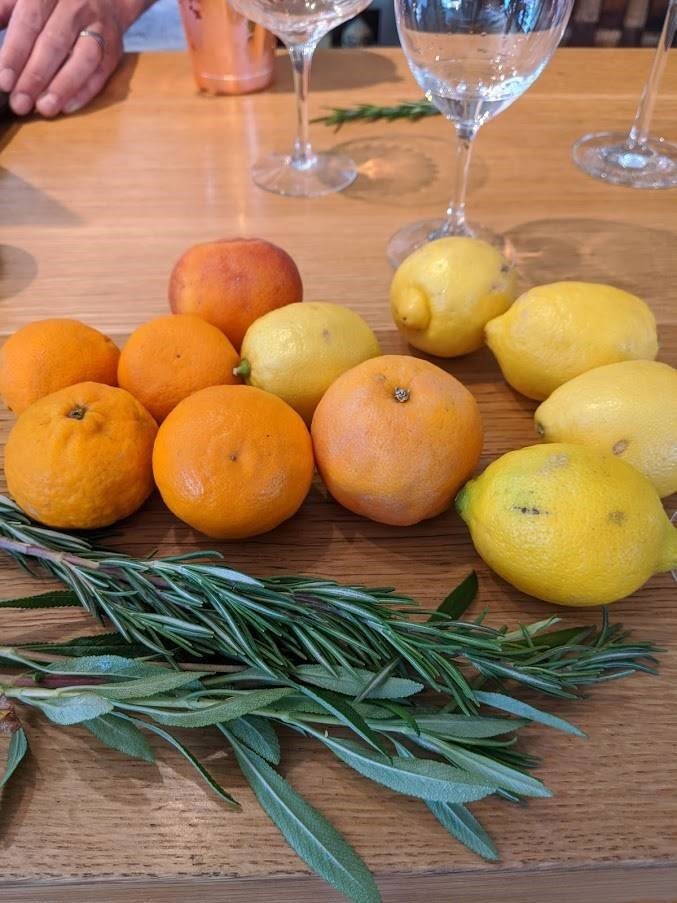
by Sam Guy, the Vine of Ojai
Ingredients
2 oz. Bourbon
.5 oz Honey Turmeric Syrup (equal parts honey and water, 4 knobs of turmeric sliced and simmered in honey-water solution)
.25 0z Lemon Juice
1.5 oz Pixie Tangerine Juice
Directions
- Combine in shaker
- Shake and strain over fresh ice
- Garnish with pixie wheel.
Enjoy! 
About The Vine
Here at The Vine you’ll find inviting atmosphere, amazing staff, the best regulars Ojai has to offer, and tasty food and drinks. Community runs through everything we do.
Butter Cookies
B U T T E R C O O K I E S 
By Jeri Oshima, Four Worlds
These are one of my favorite cookies, and they have often appeared on the dessert platters in the Ojai Music Festival Lounge during the weekend.
Ingredients
2 cups unbleached all-purpose flour
3/4-teaspoon sea salt
1 cup best quality unsalted cultured butter, at room temperature
2/3 cup granulated sugar
1 large egg yolk
1 teaspoon vanilla bean paste (or vanilla extract)
about 1/3 cup coarse sugar for rolling
Directions
- Sift together dry ingredients
- In a bowl of a stand mixer, with paddle attachment, combine and beat together, butter and sugar until light and fluffy
- Beat in egg yolk and vanilla bean paste, until combined
- Slowly add dry ingredients, until dough just comes together – don’t overmix
- Roll dough into two logs, each about 8” long
- Roll each log in the sugar, wrap in plastic and refrigerate until firm
Preheat oven to 325 degrees.
- Unwrap dough and slice into 1/3” slices
- Arrange on cookie sheets, lined with parchment paper, at least 1“ apart
- Bake until coolies are golden and start to brown around the edges, about 16 minutes
Remove cookies from oven, let cool on a rack. Store in airtight container, up to a week.
[Makes about 50]
F O U R W O R L D S / C H E F J E R I O S H I M A
Jeri Oshima has been a caterer and private chef in Ojai for over 15 years. She has cooked in Washington, DC, New York, and Whistler, British Columbia. She splits her time now between Ojai, California and Montreal, Quebec, creating a food style and presentation that incorporates a fusion of cultures and cuisines, from the modern French to the California fresh to the rustic Japanese of her family. Follow Four Worlds and Jeri Oshima on instagram : fourworlds4u
Musical Segues: Where they are now
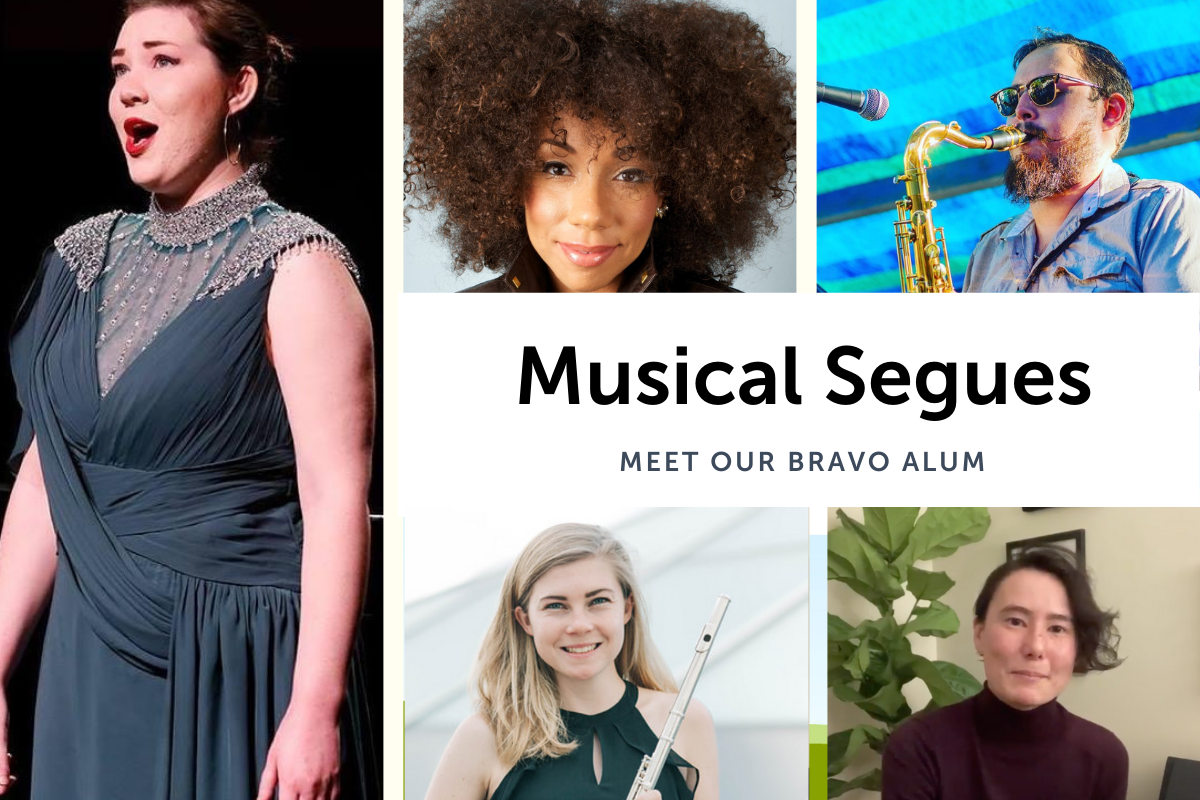

Musical Segues is a recurring segment of the Ojai Music Festival’s BRAVO education & community program that introduces our amazing alumni, who either went through the BRAVO program via the Ojai Valley public schools or participated in our Festival Arts Management Internship program.
Every month we will give glimpses into their world, personal journeys, and how music made an impact on their lives.
- Kari Frances
- Ryan Strand
- Emily Redmond Hall
- Emily Praetorius
- Kathryn Carlson
- Ruben Salinas
- Emily Persinko
- Adryon de León
- Dominique Wright
Kari Frances
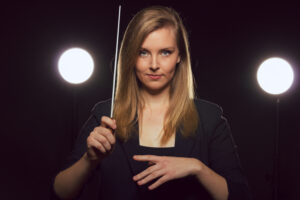 “BRAVO programs have fostered a supportive community of musicians and a culture of concertizing that helped define Ojai’s musical ecosystem, which I definitely benefited from. I can’t stress enough how important it was to see the vocal groups Sovoso at Nordhoff, and the Yale Spizzwinks , and how excited that got me for exploring a cappella in college.”
“BRAVO programs have fostered a supportive community of musicians and a culture of concertizing that helped define Ojai’s musical ecosystem, which I definitely benefited from. I can’t stress enough how important it was to see the vocal groups Sovoso at Nordhoff, and the Yale Spizzwinks , and how excited that got me for exploring a cappella in college.”
What was your experience of music when you were young?
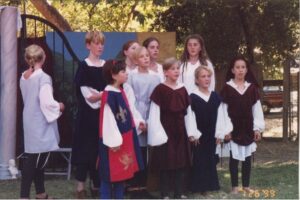 During elementary school, I began singing with Harmonia Mundi, the youth incarnation of Madrigali (a renaissance a cappella group with which my dad, Wayne Francis, sang, which was directed by Jaye Hersh). I think my most direct participation with BRAVO was in high school through the Ojai Youth Symphony and occasional collaborations with Santa Barbara Youth Symphony. I dove into as many music ensembles as I could at Nordhoff High School, primarily under the direction/tutelage of Bill Wagner.
During elementary school, I began singing with Harmonia Mundi, the youth incarnation of Madrigali (a renaissance a cappella group with which my dad, Wayne Francis, sang, which was directed by Jaye Hersh). I think my most direct participation with BRAVO was in high school through the Ojai Youth Symphony and occasional collaborations with Santa Barbara Youth Symphony. I dove into as many music ensembles as I could at Nordhoff High School, primarily under the direction/tutelage of Bill Wagner.
What are your memories of the Ojai Music Festival and Libbey Park?
The Ojai Festival programmed Ligeti’s Poème symphonique at some point; I recall helping manage some of the metronomes for the performance. My parents still have the t-shirt! I also played percussion in Ojai Band, played a little piano at Holy Cross Lutheran Church and in a few of the Holiday Home Look-in fundraisers, and continued to sing with Harmonia Mundi, which collaborated with the Ojai Shakespeare Festival during the summer.
Have you continued to study music?
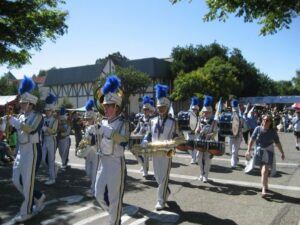 I became deeply involved with collegiate a cappella during college at UC San Diego, joining two student groups as well as an LA-based septet and founding a professional sextet while majoring in music theory (and minoring in Japanese Studies and amassing credits in visual arts classes, both of which remain hobbies). Since then I’ve worked as a freelance vocal/choral arranger, written for or edited books relating to a cappella, caught a fun break and was able to perform an a cappella tune with Imogen Heap when she toured to San Diego in 2010, was on a reality TV show called “The Sing-Off” (Season 3 with the group Kinfolk 9), received master’s degrees in music education from the Eastman School of Music and Teachers College Columbia University, was a conducting fellow with the Young People’s Chorus of New York City, co-directed a treble barbershop chorus, the Sirens of Gotham, to a first-place finish at an international competition, and was a teaching artist and adjunct professor at Hunter College and The New School for a few years before my current position.
I became deeply involved with collegiate a cappella during college at UC San Diego, joining two student groups as well as an LA-based septet and founding a professional sextet while majoring in music theory (and minoring in Japanese Studies and amassing credits in visual arts classes, both of which remain hobbies). Since then I’ve worked as a freelance vocal/choral arranger, written for or edited books relating to a cappella, caught a fun break and was able to perform an a cappella tune with Imogen Heap when she toured to San Diego in 2010, was on a reality TV show called “The Sing-Off” (Season 3 with the group Kinfolk 9), received master’s degrees in music education from the Eastman School of Music and Teachers College Columbia University, was a conducting fellow with the Young People’s Chorus of New York City, co-directed a treble barbershop chorus, the Sirens of Gotham, to a first-place finish at an international competition, and was a teaching artist and adjunct professor at Hunter College and The New School for a few years before my current position.
What are you currently up to?
I am on faculty at the College of Saint Rose, as a choral director and instructor of ear training, music theory, and choral arranging. Most recently, I put together a virtual choir video (which features some Ojai singers!) when the College campus was shut down halfway through the spring semester of 2020, and a project I was involved with was featured in the New York Times (composed by Cory Smythe, who was a regular at the Ojai Music Festival the years they hosted the International Contemporary Ensemble a while ago). My hope is to finish my doctorate at some point in the not-so-distant future, emphasizing musicianship-building and generative/improvisatory practices in choral settings, which is where I hope to continue working. Visit Kari’s website here
Ryan Strand
“If you are looking for an experience the is going to challenge you, Ojai is definitely that experience…there is real family here and so much knowledge and mentoring to be gained.”
This month we highlight Ryan Strand, who was our first Steven Rothenberg Intern Fellow and continued on to become one of our cracker-jack assistant producers. Learn more about Ryan on his website here
Interested in the Festival’s Arts Management Internship program? Click here for details and application >
Emily Redmond Hall
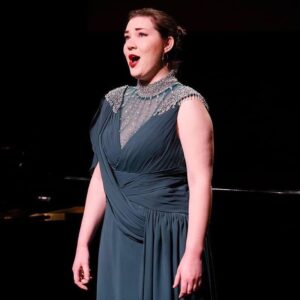
Nordhoff High School Graduate and
University of Redlands Graduate
What BRAVO programs did you participate in during K-6th grade when you attended school in Ojai? What do you most remember?
I went to Summit Elementary, Matilija Middle School and Nordhoff High School. I started singing and playing piano at the age of 6. Going to the BRAVO Imagine concert and performing in High School were enjoyable highlights! I loved the Music Van experience at Ojai Day and chose to play the flute in school. I went on to earn my college degree in classical voice.
How did your early experiences influence your life now? What are you working in?
To have a world-renowned Music Festival in our own tiny little town is so cool and so rewarding. Being able to volunteer there as a teenager was so important to me because it opened my eyes to what classical music could be—it wasn’t just Bach and Beethoven, it could be all these weird, contemporary works that I just loved and they were so inventive. It’s not usual for a someone to be exposed to this music, much less a teenager in a tiny little town.
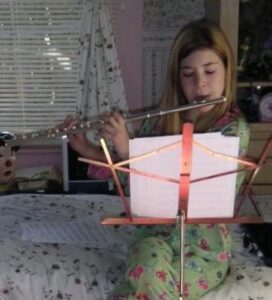 How has music impacted your life? What is your involvement with music now? Do you see yourself being involved in music in your future? What are your hopes around that?
How has music impacted your life? What is your involvement with music now? Do you see yourself being involved in music in your future? What are your hopes around that?
Performing gives me great pride and peace at the same time. Now I teach children age 3-10 at the Ventura Music Academy. I am one of the vocal directors at Ojai Youth Entertainer Studio. Being able to help young singers find their voice is an awesome thing that I get to do. Working with kids is particularly rewarding and just nourishing for the soul. It really is like passing the baton to them. Contributing to their musical education, when I had so many contribute to mine, is so cool. And I get to pass that on and watch as they grow and their skills and talents just flourish and know that I had a part in that and that they will always remember their formative musical experiences growing up. I’m always so grateful for the opportunities that I get to work with youth.
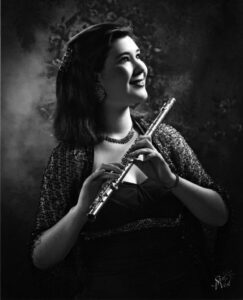 I am also involved with Ojai’s theater community, having done several shows at the Ojai Art Center. I sing and get to help to direct Madrigali, Ojai’s local renaissance acapella vocal group.
I am also involved with Ojai’s theater community, having done several shows at the Ojai Art Center. I sing and get to help to direct Madrigali, Ojai’s local renaissance acapella vocal group.
Emily Praetorius
“It’s quite unmatched in terms of the camaraderie, the friendship and bonding that happens….You really feel like you are part of this family.”
Growing up in Ojai, Emily recalls receiving free tickets to attend a Festival concert through BRAVO and got her first musical glimpse into the world of Percy Grainger. She went off to college at University of Redlands then applied to the Festival’s Arts Management Internship program where she learned everything from working retail (fond memories of our Penguin Book Booth) to eventually becoming the esteemed Rothenberg Intern Fellow. Now finishing her doctorate in composition at Columbia University under the tutelage of 2017 resident composer George Lewis, Emily continues her love of music and applying what she learned at the Festival in her current path.
Kathryn Carlson
Arts Management Intern (2017-2019)
Cal State Long Beach graduate
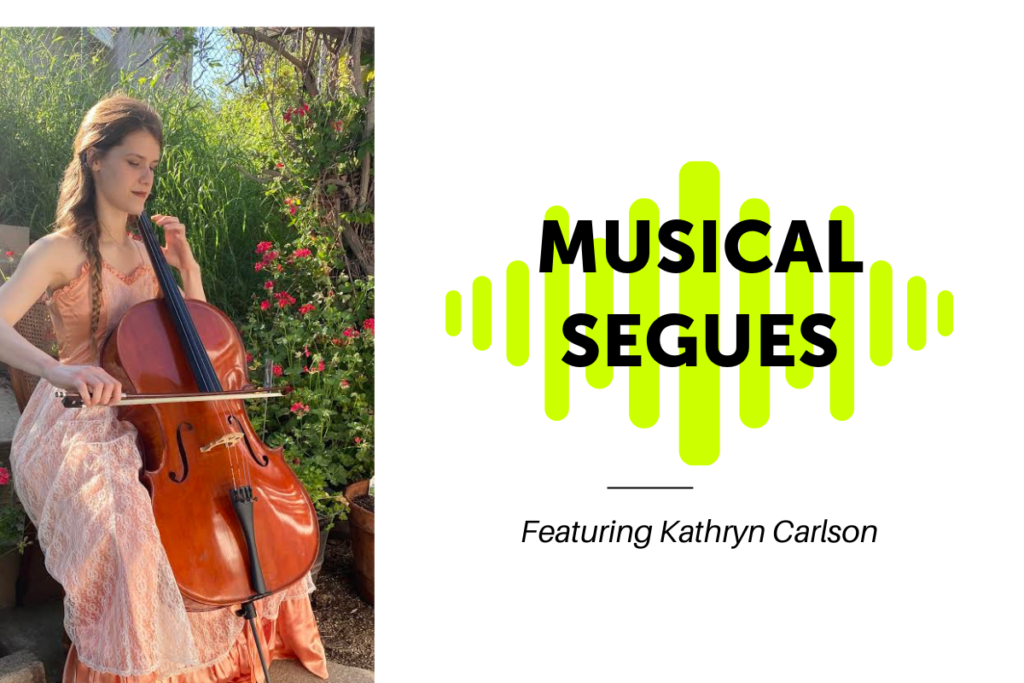
What interested you in applying to the Festival?
My first experience with the Ojai Music Festival was as a guest. I was visiting my boyfriend in his hometown of Ojai in the summer of 2016 when he told me that a music festival was going to be happening downtown. I looked into it expecting to find a folk or pop music festival and was surprised to find that it was centered on contemporary classical music. As a trained contemporary classical cellist myself, I knew I had to attend! Peter Sellars was the Music Director in 2016, and that year I was impressed to see that there was a focus on music written by women. To this day one of my favorite memories is laying on the festival lawn absorbing the sounds of Roomful of Teeth singing Caroline Shaw’s Partita for 8 Voices.
A year later while I was studying at UCSB, our department put out a notice that the Ojai Festival was looking for interns. After what I’d experienced the year before, I had to be involved, and that’s how I ended up applying for the first time in 2017.
What was my favorite Ojai experience?
This may sound odd but one of my favorite experiences was when a guest came up to the box office outraged by the music he had heard and demanded his money back because it “wasn’t music” in his opinion. I watched the Box Office Manager at that time calmly have a long, in-depth conversation with the customer about the nature of the piece, and I’ll never forget how such a meaningful conversation had been inspired by an initially negative reaction. The customer walked away with a different mindset, and even though he may not have personally enjoyed that particular performance, many other audience members after the concert came out saying how much they loved what they had just heard. I love that Ojai produces challenging experiences that we can talk about and use to learn about each other.
What was an a-ha moment working in any of the Festival departments?
Honestly, an a-ha moment during my first year as an intern was realizing that the core team of the Ojai Music Festival is small. It’s extremely impressive that this small group of people completely transforms a local park into a world-class festival venue in the span of just a week. It’s inspiring that so much can happen with a small, dedicated group of people.
What are you up to now?
I graduated just this spring from California State Long Beach with my Masters in Instrumental Performance. I currently have a small studio of cello students and also work part time on the side. I’ve been participating in a virtual ensemble that my housemate started at the beginning of the quarantine called the Philanthropic Philharmonic (@philanthropicphilharmonic) which puts together recordings of musicians from all over in order to raise money for charity. I’ve also been working on making arrangements for one to four cellos that I record myself and edit together. I’m hoping to release some soon once I have them all polished. Follow me @kathrynmakesmusic on Instagram if you’re interested in following my progress!
Ruben Salinas
“I find that music is an emotional outlet for me. It’s the thing that gives me the greatest passion.”
This month features Ruben Salinas who went through various music programs in the Ojai Valley including our BRAVO in the schools. Raised in Ojai and a graduate from CalState University Northridge’s music program, Ruben has been an active musician playing saxophone in recording studios and concerts for such artists as Eric Burdon, Noble Creatures, Kenny Loggins, and Jewel. In years past before the pandemic, you could also find him sharing his music at Ojai stomping grounds like the Vine.
Emily Persinko
Meet Emily Persinko, who interned with the Ojai Music Festival from 2016 to 2018. After graduating from San Diego State University, Emily has been working in various arts administrator roles for performing arts organizations, which have included the San Diego Symphony, Art of Elan, La Jolla Music Society, San Diego Youth Symphony, and San Diego State University School of Music and Dance. Emily currently leads the operation of the San Diego Symphony’s learning and community engagement programs and serves as a director on the board for the San Diego Flute Guild.
Adryon de León
Nordhoff High School Graduate
Adryonmusic.com
 Adryon de León was born and raised in Ojai, CA. Over formative years, musical theater infused her life. She has performed background vocals for Macy Gray, Patti Austin, The Growlers, and George Clinton. In 2013, she joined the acclaimed Los Angeles-based soul & funk group Orgone. Orgone’s most recent release, Reasons, features tracks spotlighting de León in a main writing and collaborative role. She also lends her voice to commercial studio sessions worldwide, demoing tracks for production companies. In Spring 2019, Adryon appeared as “Alana” in a production of The Little Mermaid: Live-to-Film at the Hollywood Bowl, featuring Lea Michele, Harvey Fierstein , Peter Gallagher, Cheech Marin, and Leo Gallo.
Adryon de León was born and raised in Ojai, CA. Over formative years, musical theater infused her life. She has performed background vocals for Macy Gray, Patti Austin, The Growlers, and George Clinton. In 2013, she joined the acclaimed Los Angeles-based soul & funk group Orgone. Orgone’s most recent release, Reasons, features tracks spotlighting de León in a main writing and collaborative role. She also lends her voice to commercial studio sessions worldwide, demoing tracks for production companies. In Spring 2019, Adryon appeared as “Alana” in a production of The Little Mermaid: Live-to-Film at the Hollywood Bowl, featuring Lea Michele, Harvey Fierstein , Peter Gallagher, Cheech Marin, and Leo Gallo.
What BRAVO programs did you participate in during K-6th grade when you attended school in Ojai? What do you most remember?
I went on an Ojai Music Festival-sponsored field trip to the Imagine Concert at the Libbey Bowl to see LA Philharmonic perform “Peter & the Wolf” for the students! The exposure to this performance captured the attention of every single child in the audience, for the entire sitting. Sonically, the feeling of the orchestra for the first time was overwhelming. It made me want to pick up my instrument and make some noise. I played flute in concert band, grades 4-6!
How has music impacted your life? What is your involvement with music now? Do you see yourself being involved in music in your future? What are your hopes around that?
Music is now my entire life. I transitioned to full time professional vocalist in 2011, touring worldwide with my band Orgone, working in Los Angeles providing vocals for film, television, demos, background vocals, and live performances. Eight years ago was cast at the Disneyland resort as a featured principal performer.
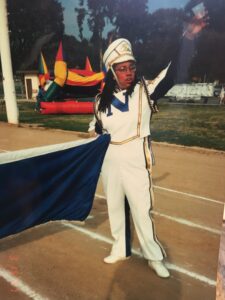 I can’t imagine myself not fully immersed in a music career in the future, whether it be as an instructor, mentor, or performer. My hope is to foster a comprehensive music career while I am able and to leave a positive legacy.
I can’t imagine myself not fully immersed in a music career in the future, whether it be as an instructor, mentor, or performer. My hope is to foster a comprehensive music career while I am able and to leave a positive legacy.
How did your early experiences influence your life now? What are you working in?
Music infiltrated every aspect of my life as a child. My mom is musical, my siblings are involved in various projects, and Ojai fostered a beautiful community of artistic kids just like me. I’m currently majoring in Business Administration and working as many studio projects from home as I can. I’m also working on my solo record and collaborating with other artists.
Dominique Wright
Arts Management Intern
Occidental College, Class of 2020
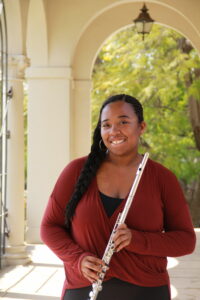 What interested you in applying to the Festival?
What interested you in applying to the Festival?
I applied to the Festival the summer after my freshman year as my Chamber Music coach told me about the program. I had just gotten into social media marketing at my school (Occidental College) and we agreed this would be a great opportunity to improve those skills as well see what happens behind the scenes – there’s A LOT that goes on.
Eventually, I went on to intern at the Festival for three years: 2017, 2018 and 2019. During those formative summers, I was able to work in three different areas: marketing, retail and the box office.
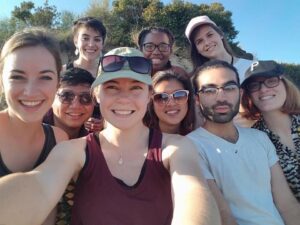
What was your favorite Ojai experience?
I have to say my favorite Ojai experience were outings the interns did together. While we all had busy days, we always had time – at least before the Festival started – for ourselves, and most of the time we would go out for dinner, go to the beach or on a hike. These are your colleagues for the two to three weeks while we are in Ojai, so these outings felt like co-workers hanging out and just recharging for the next day.
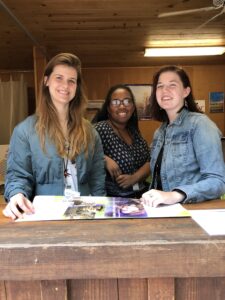
What was an “a-ha” moment working in any of the Festival departments?
Working in the box office, I was able to interact with patrons and the ticketing system which helped me see where our guests were coming from. There were people who would travel hours to come to the Festival. It was an amazing discovery because it showed the impact it had on people and how music brings people together. That’s something I aim to achieve in my career, whatever that may be!
What are you up to now?
This past May, I graduated from Occidental College with a BA in Flute performance and a minor in media studies. Currently I am applying to grad programs for arts administration as well as marketing and looking for jobs to gain more experience, and honestly, keeping myself busy in quarantine. Working in the arts field was never a future I saw for myself until interning at the Festival. I’m aware that my future jobs may not be the same as a festival environment, but this internship was what I always looked forward to throughout the school year; knowing that at the end, I get to go back and be with my Ojai family.
In fact, I’m not the only one who has these career goals, some intern alumni have already started making their mark in the arts workplace, some of which you’ll be hearing from very soon. I look forward to sharing their stories these next several months!
About the Arts Management Internship program
2019 Applications for the Arts Management Intern Program Now Available
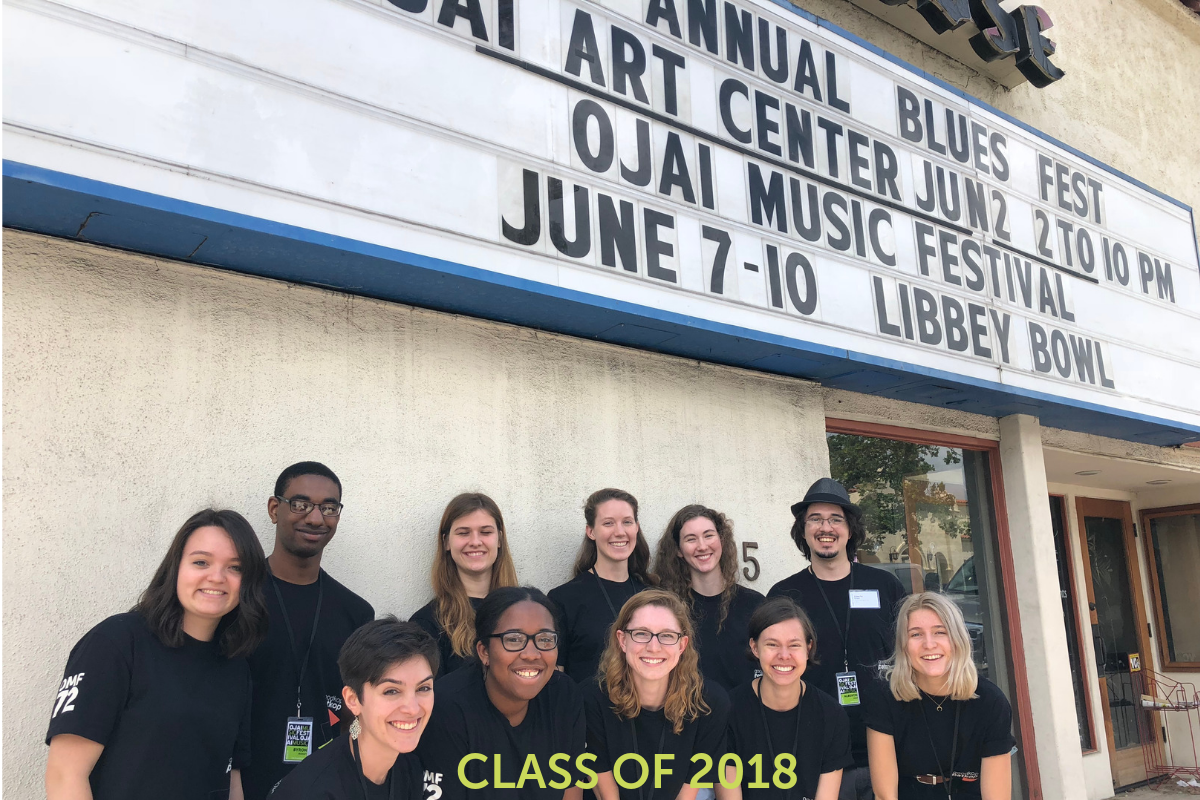
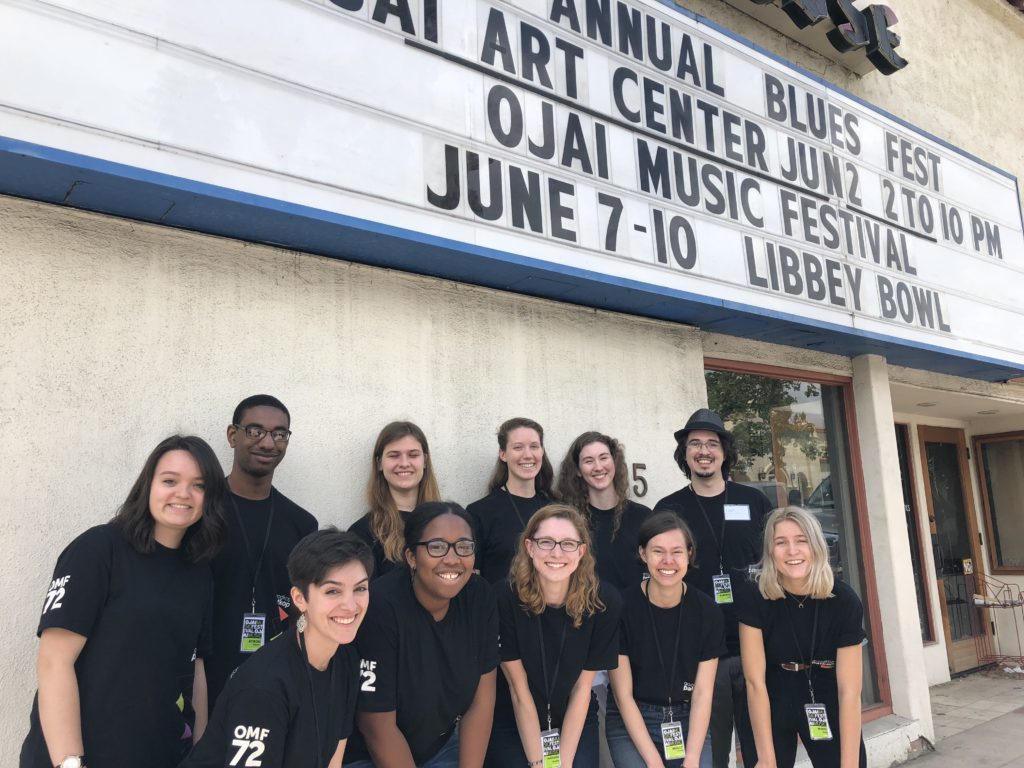
(OJAI, CA) – The Ojai Music Festival’s arts management internship program is now accepting applications for the 73rd Ojai Music Festival slated for June 6 to 9, 2019 with soprano and conductor Barbara Hannigan as music director. Entering its 12th year, the Festival’s sought-after program provides hands-on experiences to college students as they are immersed in areas of production, administration, operations, special events, merchandising, live streaming, marketing, public relations, and patron services.
Students from varying fields and walks of life enjoy access to different opportunities which give them new skill sets and experiences that they take with them throughout their careers. The internship program also provides them to interact with leaders in the music industry and create lasting friendships with other students.
Applicants must be 18 or over and enrolled in a two or four year accredited college. The Festival provides housing for the duration of the internship as well as a stipend. Applications are due by March 1, 2019. Download the application here.
About the Ojai Music Festival
From its founding in 1947, the Ojai Music Festival has created a place for groundbreaking musical experiences, bringing together innovative artists and curious audiences in an intimate, idyllic setting 80 miles northwest of Los Angeles. The Festival presents broad-ranging programs in unusual ways with an eclectic mix of rarely performed music, refreshing juxtapositions of musical styles, and works by today’s composers. The four-day festival is an immersive experience with concerts, free community events, symposia, and gatherings. Considered a highlight of the international music summer season, Ojai has remained a leader in the classical music landscape for seven decades.
Through its unique structure of the Artistic Director appointing an annual Music Director, Ojai has presented a “who’s who” of music including Aaron Copland, Igor Stravinsky, Olivier Messiaen, Michael Tilson Thomas, Kent Nagano, Pierre Boulez, John Adams, Esa-Pekka Salonen, Robert Spano, Pierre-Laurent Aimard, David Robertson, Eighth Blackbird, George Benjamin, Dawn Upshaw, Leif Ove Andsnes, Mark Morris, Jeremy Denk, Steven Schick, Peter Sellars, Vijay Iyer, Barbara Hannigan (2019), and Matthias Pintscher (2020).
The 73rd Ojai Music Festival, June 6 to 9, 2019, will celebrate and explore the creative breadth of Music Director Barbara Hannigan, as conductor, singer, and mentor. Joining Ms. Hannigan will be the US debuts of her mentoring initiative for young professional artists, Equilibrium (EQ), and the orchestral collective from Amsterdam, LUDWIG, with whom Ms. Hannigan made her Grammy Award-winning conducting debut CD “Crazy Girl Crazy” in 2017.
The 2019 Festival program will feature works by composers central to Ojai’s history and future, including John Luther Adams, Gerard Grisey, Oliver Knussen, Catherine Lamb, Olivier Messiaen, Terry Riley, Arnold Schoenberg, Tyshawn Sorey, Igor Stravinsky, Mark-Anthony Turnage, Claude Vivier, and John Zorn. Highlights will include the staged production of Stravinsky’s The Rake’s Progress with Ms. Hannigan conducting and members of EQ as the cast; Ms. Hannigan performing in Gérard Grisey’s Quatre chants pour franchir le seuil; the Ojai premiere of John Zorn’s Jumalattaret and Girl Crazy Suite, a special arrangement by Bill Elliott of songs from the Gershwin musical.
For more information regarding the internship program for the Ojai Music Festival, please call the main office at 805 646 2094 or email [email protected]. For more information on the Ojai Music Festival, visit OjaiFestival.org.
Meet Our 2018 Interns!
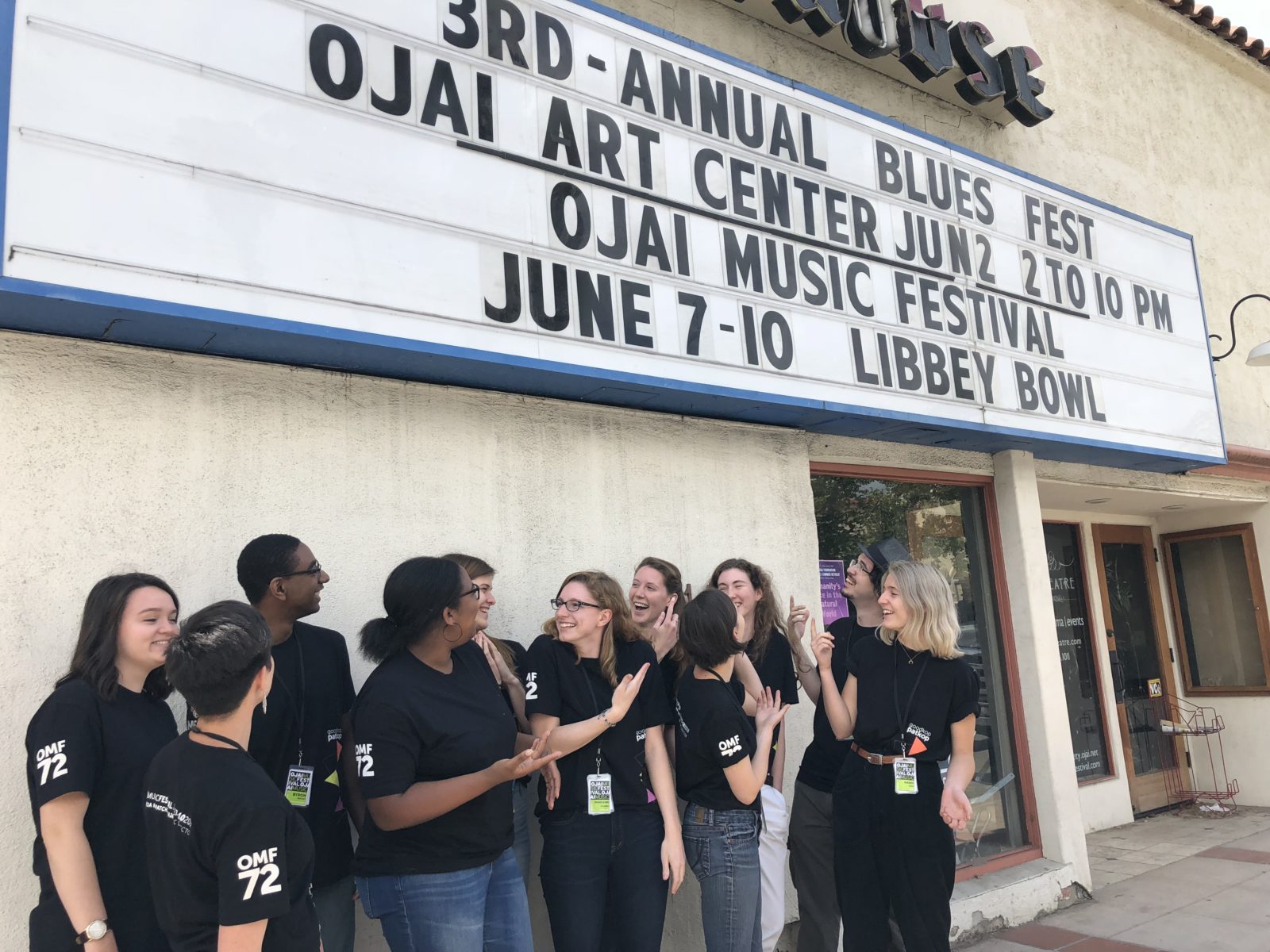
Each year, the Ojai Music Festival Arts Management Internship Program welcomes 12-14 college students and recent graduates to go behind the scenes of a renowned summer music festival. We are very excited to introduce this year’s wonderful interns!
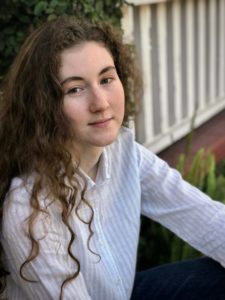 Glenna Adkins:
Glenna Adkins:
Glenna Adkins is a cellist and improviser who grew up in Los Angeles. She currently studies music and writing at Sarah Lawrence College in New York. As an instrumentalist, composer, and avid music listener, she is passionate about the performance of new music, as well as the collaborative process between artists. Inspired by the intersection of different art forms, Glenna also composes and performs for works of derived theater and dance, exploring ideas of musical narrative through extended techniques. She has worked at REDCAT and at Reisinger Concert Hall and has recorded as a session musician in several film soundtracks. Additionally, Glenna is interested in issues of sustainability and has served as an Education Intern at the Science Barge in Yonkers, NY, giving school children guided tours of the institution’s hydroponic growing systems.
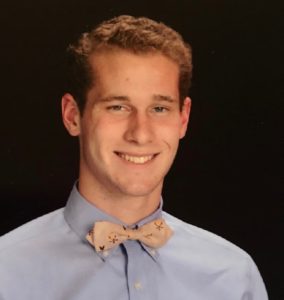 Peter Appleby:
Peter Appleby:
Peter Appleby is a resident of Santa Paula and has developed a great appreciation for community events and local music festivals. After graduating from Villanova Prep School this spring, Peter will be studying International Relations at California Lutheran University in the fall. An amateur musician himself, Peter has had the privilege of participating in Claire Chase’s performance of PAN in 2017 through the Ojai Music Festival. He is excited to return to Ojai this summer and is eager to help with the festival.
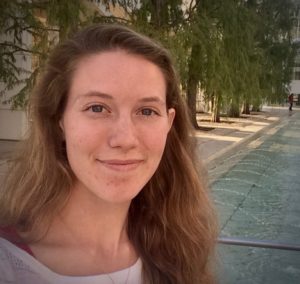 Zoe Appleby:
Zoe Appleby:
Zoe Appleby is a Southern California resident who is lucky enough to have been involved in the Ojai Music Festival for three years now. For undergraduate school, Zoe attended Thomas Aquinas College in Santa Paula, CA, where she studied the greatest works of Western thought and literature in a Great Books Program. After spending six weeks in the summer of 2017 in Rome, Italy, studying art history, she decided that the academic field of art history was where she passions lay. Zoe has since been accepted into UC Riverside’s Art History department as an MA student studying medieval art history. After eventually completing her Ph.D. at a different institution, she would be interested in both teaching and researching at the college level and perhaps curating at a museum. She is passionate about bringing the arts to the public, and she has found the Ojai Music Festival to be an amazing event for her to experience the worlds where art and business meet to make something truly beautiful. She recently held a curatorial internship at the Santa Paula Art Museum, an institution which, like the Ojai Music Festival, embodies the spirit of artistic progress and public outreach. Zoe can usually be found swimming at one of the Southern California beaches, or rock-climbing in the cliffs above Ojai.
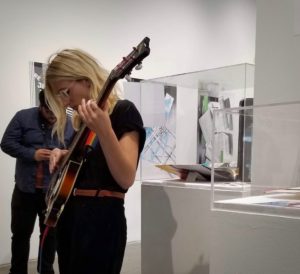 Maddi Baird:
Maddi Baird:
Maddi Baird is an undergraduate music composition major at San Diego State University. She has had a passion for music and the arts from a young age, and has carried this passion by playing French horn, bass guitar, and by playing in SDSU’s Javanese Gamelan. While studying under Dr. Joseph Waters and Dr. Chris Warren, she has developed a passion for synthesis and analog synthesizers. In the future, she hopes to pursue a graduate degree in film scoring. Within her first semester at SDSU, she has acquired a position at their student union as an Audio-Visual technician and is the recipient of the Frank McCarty Endowed Scholarship in Music Composition. Maddi spends her free time volunteering at Ship in The Woods, a nonprofit art museum. She also has a radio show for KCR College Radio.
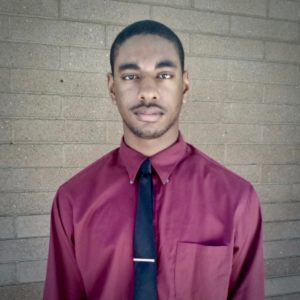 Byron Beasley:
Byron Beasley:
Byron Beasley studies music technology at San Diego State University. He has been playing musical instruments since the age of 9 and currently composes music for the Trombone Ensemble at San Diego State. Byron also works as a studio technician at San Diego State, and has experience working with a variety of clients on a daily basis. At the studio, Byron’s job consists of assisting clients with audio and visual productions.
In high school, he worked as a section leader of the brass section, and has performed with a variety of ensembles. Byron also has experience playing in jazz band, marching bands, and wind ensembles (with jazz band being his favorite). He loves to listen to jazz in his free time and enjoys exercising as well. Byron has also composed music for a few video games, and so his diverse experiences in music make him a well-rounded musician, producer, and composer. His greatest aspiration is to work in the music and entertainment industry. Byron loves working behind the scenes to ensure that a product can come to fruition.
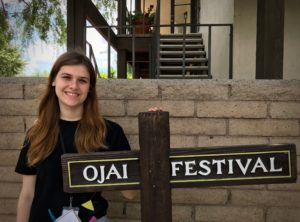 Kathryn Carlson:
Kathryn Carlson:
Kathryn Carlson is a cellist who will soon be receiving her diploma for her Bachelor of Music degree in Instrumental Performance with cello emphasis from the UCSB music department. She is interested in pursuing new music, which she became involved in during her sophomore year of high school after being introduced to it by her music theory teacher Mr. Hertzog (composer for the kung-fu film Bloodsport). She has been a member of the UCSB Ensemble for Contemporary Music (ECM) throughout her time at UCSB and has performed new works in various concerts, including the 2016 UCSB Summer Music Festival, and the Beethoven, New Music, and Cupcake Bar concert hosted by the Now Hear Ensemble. In 2016 she was awarded the ECM Distinguished Performance Award and has recently performed in master classes hosted by The Knights and the Juilliard String Quartet. Having been an intern for the 2017 Ojai Music Festival, she is looking forward to joining the fantastic Ojai Music Festival team once again.
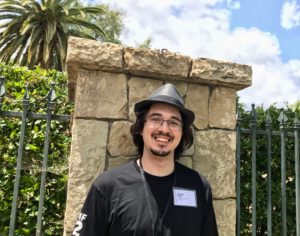 Alberto Cruz:
Alberto Cruz:
Alberto Cruz is a composer and recording engineer, currently studying composition at the California Institute of the Arts. During his time there, he has studied with, and continues to work with, Anne LeBaron, Matthias Webber, Karen Tanaka, Nora Kroll-Rosenbaum, John Baffa, and Bob Clendenen. He has fully committed himself to a curriculum at CalArts consisting of composition for film and media, as well as recording and mixing in both live and studio settings. Currently, Alberto works for the School of Film/Video at CalArts running various recording sessions for ADR, spoken word, foley, and music. He also works for the Herb Alpert School of music, recording for live and studio musicians, running a webcast/lighting board for live shows, and acting as a producer/promoter for various shows. When not at CalArts, he works as a studio intern for Matthew Snyder at Allegro Recordings. During his time at CalArts so far, Alberto has produced six shows, played clarinet and other instruments in numerous ensembles, written music for seven films, worked as a sound designer for two films, handled music preparation/orchestration for various established composers around LA, run countless recording sessions for animators, directors, solo musicians, large ensembles, and a large variety of people from other backgrounds, and written over ten performed works for the concert stage. Entering his fourth year of higher education, Alberto’s passion for film music and recording has been fully realized into a reality that he intends to pursue throughout the rest of his life.
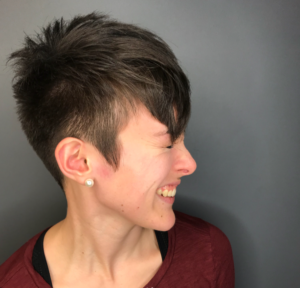 Jamie Leidwinger:
Jamie Leidwinger:
Jamie Leidwinger is a Baltimore-based composer. She received her MM in Composition at the Peabody Institute of Johns Hopkins, a BA in Music from Dickinson College, and her teachers include Pulitzer Prize-winner Du Yun, Amy Beth Kirsten, Douglas Buchanan, and David Smooke. Jamie previously interned with the Ojai Music Festival, Q2 Music (NYC, now NewSounds), the Artistic Director of Symphony Space (NYC), and recently produced Q2 Music’s Instagram takeover series, “A Day in the Life,” as a freelance contributor; she is currently an Associate Artist Fellow with Amy Beth Kirsten’s music-theatre ensemble HOWL. Current projects include a podcast featuring interviews with Peter Sellars, Alex Ross, and more (release: Summer 2018), a collaboration with Baltimore-based street choir Voices Rise, co-founding a women’s vocal chamber octet, and co-founding SENSE, a Baltimore-based interdisciplinary, immersive, and inclusive arts series.
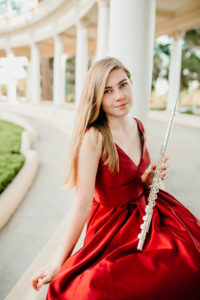 Emily Persinko:
Emily Persinko:
Emily Persinko has interned at the Ojai Music Festival for the past two years, working closely with the marketing department and the box office. Emily graduated from San Diego State University (SDSU) this spring where she studied music entrepreneurship and business and is currently pursuing a career in arts administration. Emily is an event stage manager for La Jolla Music Society, a production assistant at San Diego Youth Symphony and Conservatory, and Assistant Operations Coordinator at Art of Élan. Emily has also recently interned at the San Diego Symphony in the development department and The Broad Stage in Santa Monica as an artistic intern. Emily has held positions as the principle flutist of the SDSU Wind Symphony and Chamber Orchestra. She also teaches at a private flute studio in San Diego and recently performed her senior flute recital.
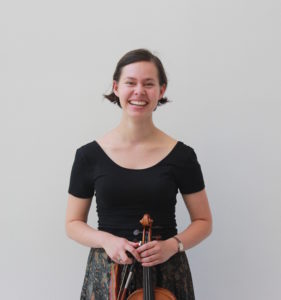 Molly Tucker:
Molly Tucker:
Molly Tucker, from Thousand Oaks, California, is currently in her third year at Oberlin College and Conservatory where she is pursuing degrees in Violin Performance and Economics. As a violinist, she has participated in such festivals as Bowdoin International Music Festival, Madeline Island Chamber Music Camp, The Apple Hill Center for Chamber Music, and the Montecito International Music Festival. Additionally, Molly has been a soloist with the Thousand Oaks Philharmonic and the California State University Northridge Youth Philharmonic. Her musical explorations have taken her to contemporary and Baroque music, as well as folk traditions. She has performed in an Oberlin Contemporary Music Ensemble performance of Hans Abrahamsen’s Schnee, as well as an Oberlin premiere of Celso-Garrido Lecca’s String Quartet No. 2, and has led and soloed with the Oberlin Baroque Orchestra. Molly has also fiddled since the age of seven and has attended Ashokan Music and Dance Camps and The Festival of American Fiddle Tunes. As a lover of contra dance, she has played dances in both California and New Hampshire, and regularly plays for the monthly dances at Oberlin. Molly is a co-founder of Quartet Davis, a string quartet that plays original arrangements of folk and jazz, which was one of the recipients of Oberlin’s Flint Initiative Grant for a three-week Midwest and East Coast tour in January 2018. She is also a part of Caraway House, a fiddle and voice duo that performs tunes from Scandinavian and Old Time traditions. In January 2017, she traveled to Amman, Jordan with an Oberlin string quartet to play at schools and public venues, including a performance with the Jordan Orchestra sponsored by the United States Embassy. She has studied with Marilyn McDonald, Linda Rose, and Kim Kilgore, and has had the opportunity to work with renowned musicians such as Kikuei Ikeda, the Punch Brothers, Fabian Almazan, The Calder Quartet, Billy Childs, and Christian Howes. Outside of her musical life, she is active in the Oberlin Student Cooperative Association, organizes the Oberlin Quaker Student Group, and works for Oberlin Conservatory Admissions.
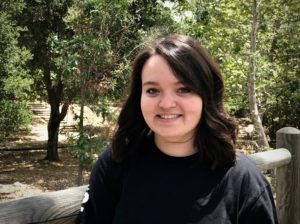 Sarah Voshall:
Sarah Voshall:
Sarah Voshall is a pianist, collaborator, and teacher based in Los Angeles county. She is currently a third year piano performance major at the California Institute of the Arts in Valencia, CA. In high school, she studied improvisation with Daniel Hopkins, who remains a constant source of inspiration. At CalArts, she is privileged to study piano with Ming Tsu, and greatly appreciates the mentorship of Vicki Ray. She has also studied harpsichord with Tisha Mabee. Sarah’s current interests lie in methodically exploring the keyboard works of Bach alongside the surprisingly parallel piano pieces of Bartok. Recently, Sarah has found an interest in learning and performing chamber works with a trio of fellow CalArtians. As a means of cultivating a culture of music (and paying the bills), Sarah has been giving private piano lessons to students of all ages for the past decade. Sarah also teaches piano classes at West Creek Academy to second and third graders, a group of musicians whose youthful enthusiasm continues to delight and exasperate her in equal parts. In her spare time, Sarah enjoys spending time with her little sister who educates her in the memes of the day and forces her to listen to musical theatre soundtracks.
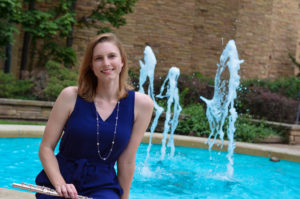 Madeleine Wilmsen:
Madeleine Wilmsen:
Madeleine Wilmsen is a flute student at the University of Kansas and received her Bachelor of Arts in Music with a minor in Psychology in May of 2018. While attending undergrad, Madeleine participated in numerous ensembles and chamber groups. Between the years 2015 and 2017, Madeleine was a member of a flute and percussion duo that premiered new works by in-residence composers. She performed as principal player of the KU Symphony Orchestra during the Spring of 2017 and is currently the principal flutist of the KU Wind Ensemble. This spring, KUWE will perform a Reach Out Kansas commissioned piece at the Kennedy Center in Washington D.C. and will be recording a new album. For the last three years, Madeleine has served as President and founding member of the KU Flute Club. She was instrumental in the creation of the club and worked to establish many yearly events, including the annual KU Flute Day in the spring. During the fall of 2017, Madeleine worked as a Development intern at the Kansas City Symphony where she learned the ins and outs of a major non-profit and frequently communicated with symphony donors. She plans on earning a MM in flute performance and furthering her career in music (whether it be performing, teaching, or arts management).
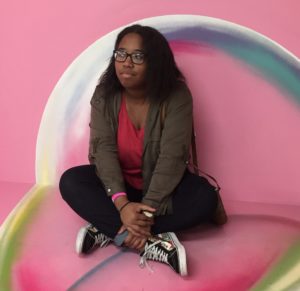 Dominique Wright:
Dominique Wright:
Dominique Wright just finished her sophomore year at Occidental College in Los Angeles, CA where she is an Economics Major and Flute Performance Minor. She is interested in continuing her work in social media marketing and is eager to work for larger companies and to gain further experience in management. Dominique has also played the flute for ten years. When she was just beginning her musical studies, she lost her flute at school. When a mother at her school heard about the lost instrument, she went home to find her old flute and brought it back to school so that Dominique could continue playing. Since experiencing that gesture of kindness, Dominique has not wanted to stop playing music. This June will be her second time working with the Ojai Music Festival and she cannot wait to take a part in the festival again.


